





www.majalla.com Issue 1926- October- 14/10/2022 2 AWeeklyPoliticalNewsMagazine www.majalla.com Issue 1926- October- 14/10/2022 James Cleverly: UK’s New Foreign SecretaryA Weekly Political News Magazine How ‘Women, Life, Freedom’ Unified All the People of Iran Putin’s Apocalyptic End Game in Ukraine Towards A New Energy World Order
Iranian protestors are pouring into streets for the second month in nationwide demonstrations after the death of the 22year-old Kurdish woman in custody of morality police. Suzan Quitaz highlights the momentum of the protests as their intensity and scale are growing focusing on the most prominent slogan being raised: “Women, Life and Freedom.” She writes about the Kurdish origin of the slogan that predates the current events and can be traced back to the PKK and Abdullah Ocalan, but now it has much broader significance. She also pinpoints the revolutionary mood of the present uprising and the solidarity between the various groups of Iranian people against the mullahs’ regime.
This week we also feature the breakthrough in the maritime demarcation between Lebanon and Israel. Suha Jaffal writes about the win-win deal, which Lebanese officials said would preserve their country’s natural wealth at an important time for the people.
Ahmed Taher writes about the recent announcement by the OPEC+ countries to limit their oil production and the reaction to the decision by foreign powers. Saudi Foreign Minister Prince Faisal bin Farhan said in an interview with Al Arabiya TV: «The OPEC+ decision is purely economic, and it was unanimously adopted by the member countries, and they do not consider any political interpretations related to OPEC+ decisions.”
In the culture section, Menna A. Farouk takes us on a visit to Egypt and the Middle East’s oldest auction hall, hosting antiques that have passed through several ages and are characterized by their precision and craftsmanship.
In the sports section, Sarah Gamal interviews Jordanian Paralympics champion and Secretary-General of Jordan’s Paralympic Committee Maha Al-Barghouthi who recalls her successful journey in sports and sends encouraging messages to young athletes.
Read these articles and more on our website eng.majalla. com. As always, we welcome and value our readers’ feedback and we invite you to take the opportunity to leave your comments on our website.




Ghassan Charbel
A Weekly Political News Magazine www.majalla.com/eng 10th Floor Building 7 Chiswick Business Park 566 Chiswick High Road London W4 5YG Tel : +44 207 831 8181Fax: +44 207 831 2310 HH Saudi Research and Marketing (UK) Ltd Editor-in-Chief
The Editor Mostafa El-Dessouki - ةكم قيرط - تارمتؤلما يح - ضايرلا اهل صخرم ىصصختلا عطاقت +44 207 831 8181 :ندنل - 4419933 فتاه :ضايرلا ،www.alkhaleejiah.com :ينورتكلإ عقوم hq@alkhaleejiah.com :ينورتكلإ ديرب + 9714 3 914440 :يبد ،920 000 417 : ةكلملما لخاد نم +44 207 404 6950 :ندنل +00764 537 331 :سيراب +966 11 441 1444 : لودلا فلتخم نمو ينلاعلإا ليكولا Editorial 2 14/10/22
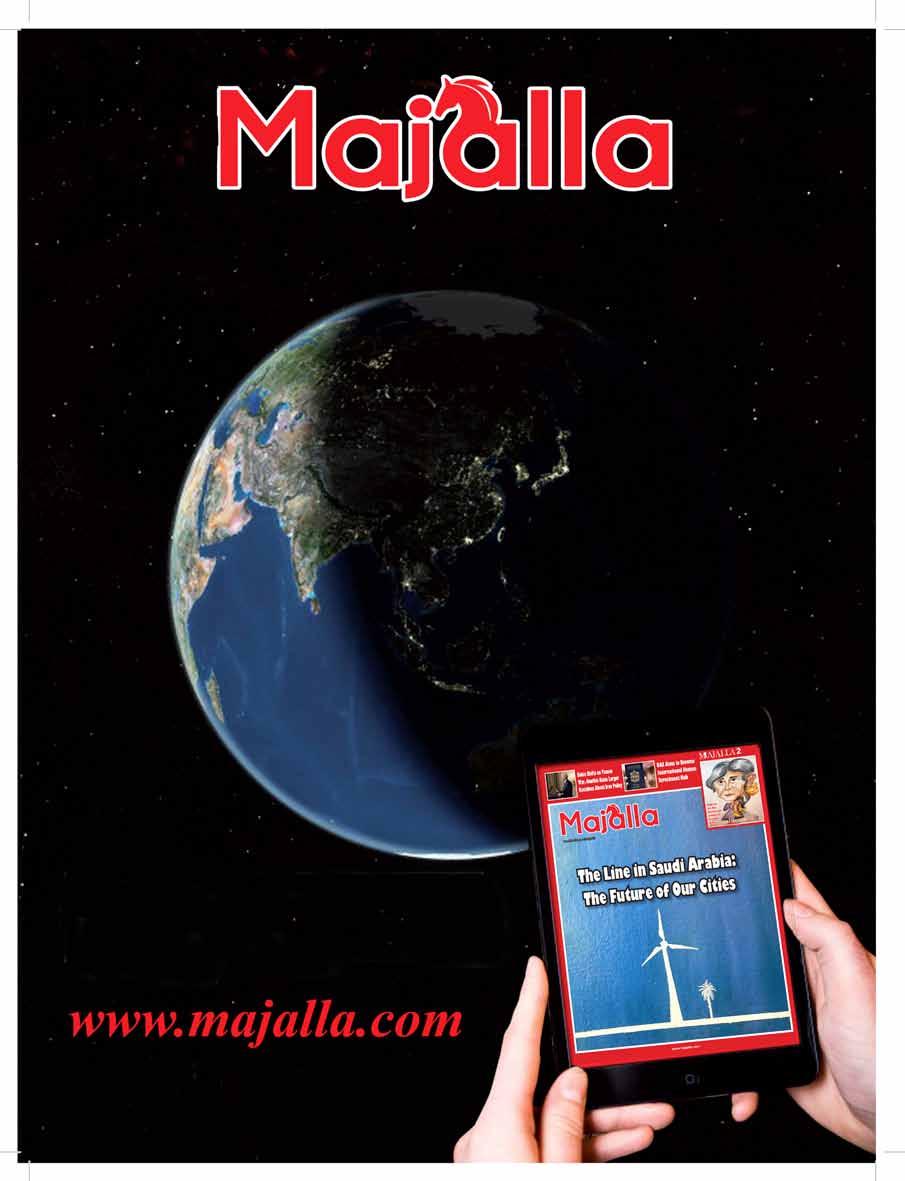
A Weekly Political News Magazine
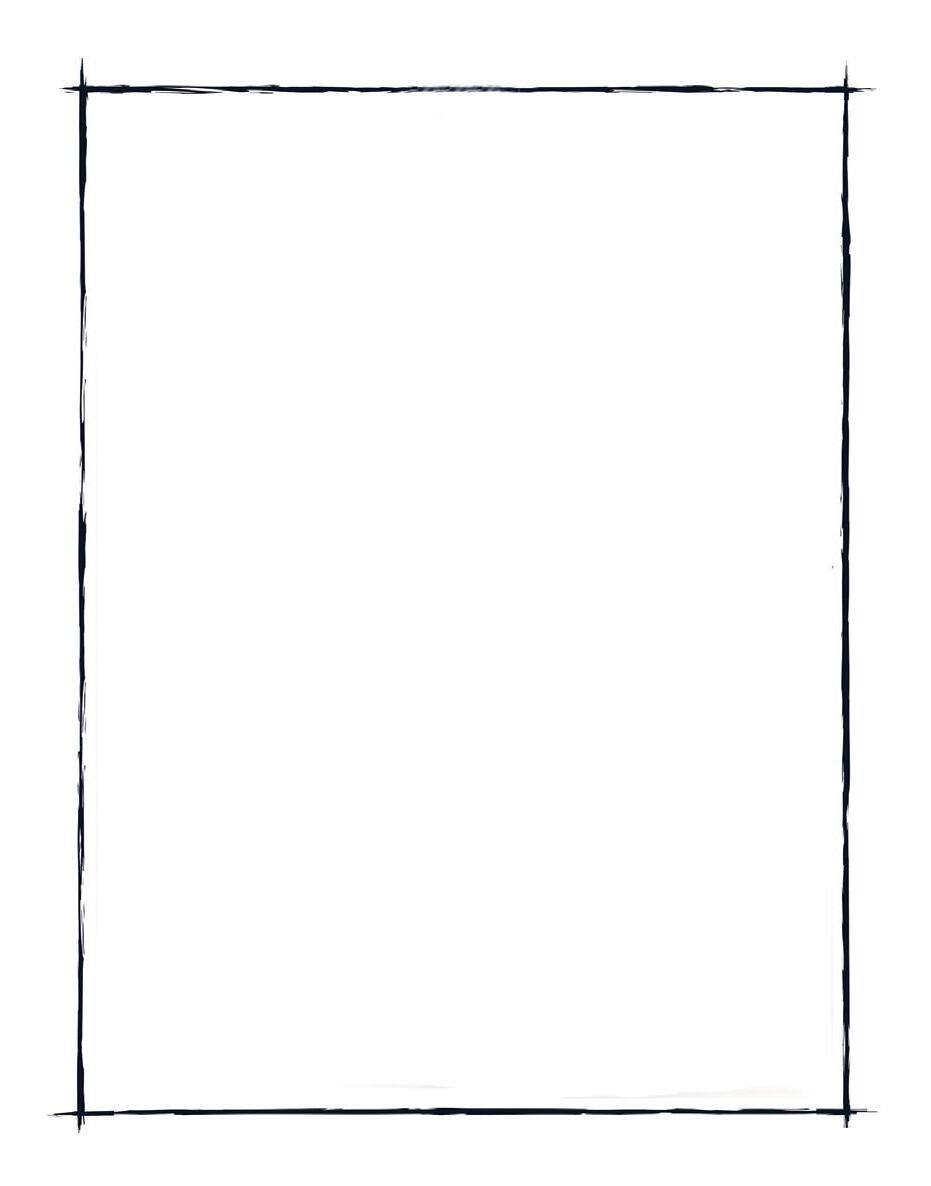
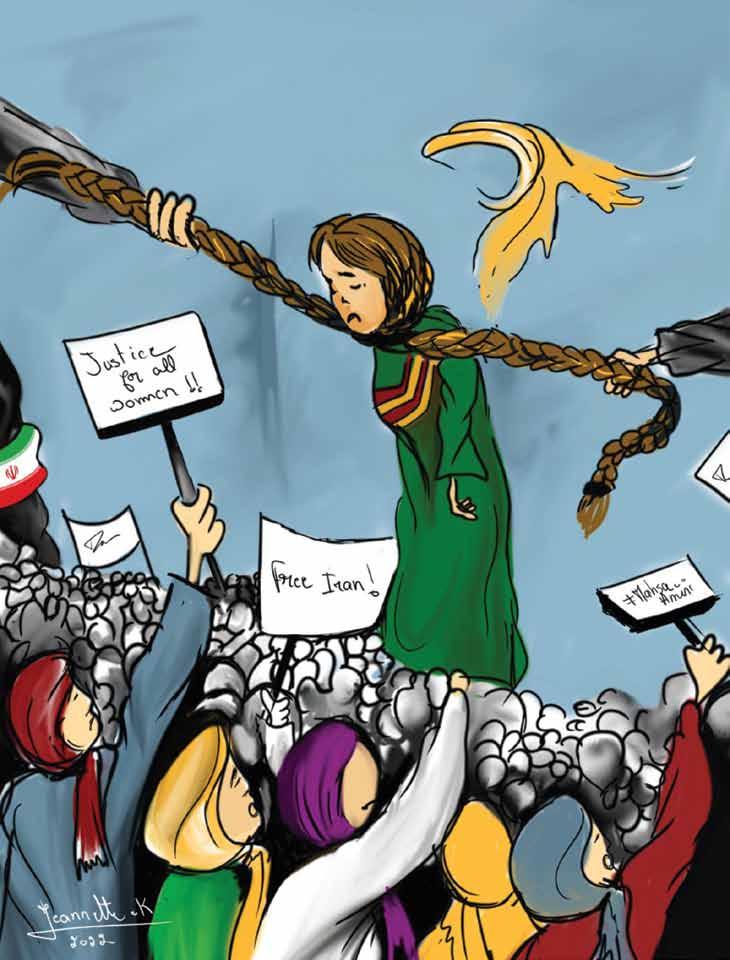

4 14/10/22







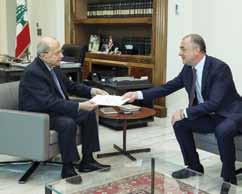

Issue 1926- October- 14/10/2022A Weekly Political News Magazine 5 14/10/22 46 Going Once, Going Twice, Sold! 58 Natural Ways to Boost Energy Racism in American TV Advertisements36 The Future of the Metaverse Hinges on Interoperability 56 50 Maha Al-Barghouthi: Jordan’s First Gold Medalist in an Olympic Event26 Win-Win Historic Agreement ‘Till’: A Powerful Portrait of a Mother Who Turned Loss Into Meaningful Action 42
napshotS
First Day of School in Baghdad

Iraqi girls arrive at their elemntary school on the first day of the school year at in Baghdad on October 12, 2022. - The Iraqi parliament meets October 13 to elect the country’s president in a move aimed at ending a nearly year-long crisis triggered by contested elections. / AFP



6 14/10/22
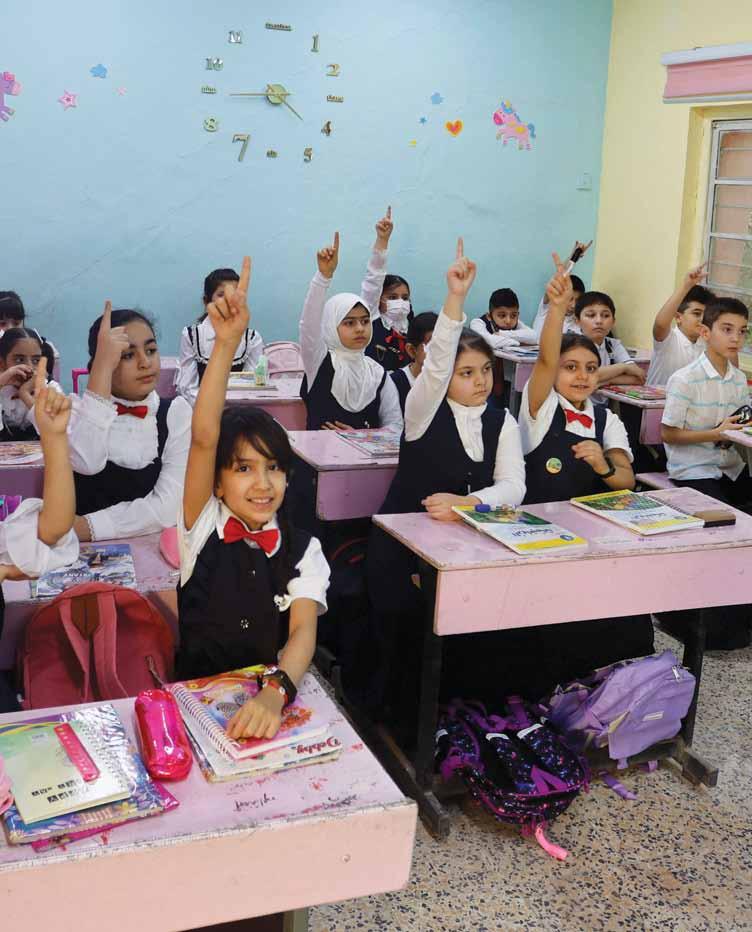
7 14/10/22
Dancers
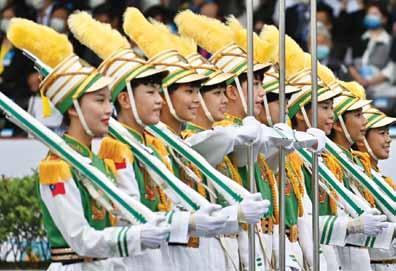
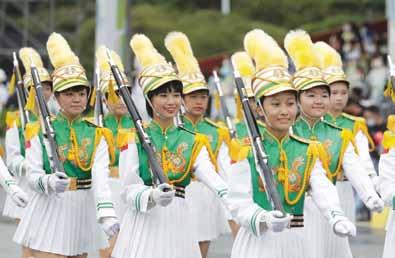


napshotS
8 14/10/22
perform during National Day celebrations in front of the Presidential Building in Taipei, Taiwan, Monday, Oct. 10, 2022. /AP Taiwan National Day

9 14/10/22
EGYPT

Egypt is pushing to tie up a crucial nancial package from the International Monetary Fund at annual meetings in Washington this week, hoping to stem a currency crisis that has restricted imports and sparked market unease over foreign debt repayments. Egypt began talks with the IMF for a nancial support package in March, soon after the Ukrainian crisis threw its already unsettled nances into further disarray and led foreign investors to pull nearly $20 billion out of Egyptian treasury markets in a matter of weeks.
The foreign exchange shortage has led to a sharp drop in non-oil imports, which fell by 20% in the April-June quarter, according to central bank data. This has led to a shortage of input for both factories and retailers, and a backlog of goods and commodities including wheat at ports.
LEBANON


Israel’s prime minister said Tuesday that the country has reached a “historic agreement” with neighboring Lebanon over their shared maritime border after months of U.S.-brokered negotiations. The agreement would mark a major breakthrough in relations between the two countries, which formally have been at war since Israel’s establishment in 1948. But the deal still faces some obstacles, including legal and political challenges in Israel. Lebanese o cials indicated they would approve the agreement. At stake are rights over exploiting undersea natural gas reserves in areas of the eastern Mediterranean that the two countries — which do not have diplomatic relations — claim.
Saudi Arabia urged the kingdom OPEC and its oil production been just before midterm elections. A statement Ministry didn’t elections, crucial maintaining majorities in

SAUDI
10 14/10/22
Arabia said Thursday that the U.S. had kingdom to postpone a decision by its allies — including Russia — to cut production by a month which would have before the upcoming American elections.
statement issued by the Saudi Foreign didn’t speci cally mention the crucial to U.S. President Joe Biden maintaining his Democratic Party’s narrow in Congress.
SAUDI ARABIA UAE

The United Arab Emirates has launched a new unemployment insurance scheme as part of reforms aimed at attracting more talent and investment to the regional business hub amid rising competition.
The new scheme, rst announced in May, o ers compensation for up to three months for public and private sector employees who lose their jobs. Both Emiratis and foreign workers will eligible for this scheme.
IRAQ
Iraq's parliament will convene this week for a session meant to elect a new president, the speaker's o ce said on Tuesday, but divisions that have led to a year-long political deadlock may still obstruct progress.

Lawmakers will meet on Thursday, more than a year since an Oct. 10, 2021, parliamentary election in which populist Shi'ite Muslim cleric Moqtada al-Sadr emerged as the biggest winner but failed to rally enough support to form a government.
Sadr has withdrawn his 73 parliamentarians from the assembly and in August announced he would quit politics, prompting the worst violence in Baghdad for years when his loyalists stormed a government palace and fought rival Shi'ite groups, most of whom are backed by Iran and have heavily armed paramilitary wings.
IRAN
Iranian security forces intensi ed a crackdown on anti-government protests in several Kurdish cities on Monday, as demonstrations elsewhere in Iran spread into the country's vital energy sector. Protests have swept Iran since Mahsa Amini, a 22-year-old from Iran's Kurdish region, died on Sept. 16 while being held for "inappropriate attire", marking one of the boldest challenges to the Islamic Republic since the 1979 revolution. While university students have played a pivotal role in the protests with dozens of universities on strike, uncon rmed reports on social media showed workers at Abadan and Kangan oil re neries and the Bushehr Petrochemical Project had joined in.
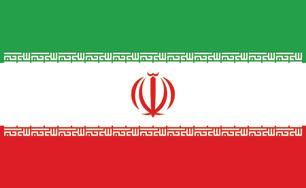
11 14/10/22
A WEEK ACROSS
BRAZIL.
Brazil’s two presidential candidates sought to firm up support in their traditional bases Wednesday, with Luiz Inácio Lula da Silva campaigning among the poor in Rio de Janeiro’(s Alemao slum and incumbent Jair Bolsonaro appearing among the faithful at the vast Aparecida basilica in Sao Paulo state.
The death toll from Tropical storm Julia rose to at least 16 on Monday, officials said, with most victims coming from El Salvador and Honduras, as the weakening storm dumped heavy rainfall on a swath of Central America and southern Mexico.
Salvadoran authorities reported the deaths of nine people, including five soldiers, and at least 830 people evacuated. Authorities in both El Salvador and Guatemala also canceled classes on Monday.
Earlier this month, da Silva, Brazil’s former president who governed he country from 2003 to 2010, topped the first round of voting with over 48% support. Bolsonaro got 43% support. Since neither received enough votes to win outright they are now headed to a Oct. 30 runoff.
U.S. U.K.

In Honduras, five victims have been confirmed including a woman who died Sunday after she was swept away by flood waters, and a four-year-old boy in a boat that capsized near the Nicaragua border on Saturday night, officials said. Panama's emergency services confirmed later on Monday two deaths as a result of heavy rains, along with around 300 people evacuated from communities near the country's border with Costa Rica.
Julia made landfall Sunday on Nicaragua's Caribbean coast before crossing into the Pacific Ocean.
Both men seem to have chosen to celebrate the nation’s patron saint, Our Lady of Aparecida, in their comfort zone.
In Alemao, surrounded by Rio Mayor Eduardo Paes and local community leaders, da Silva attacked his opponent’s public security and education policies.
Britain's King Charles III will be crowned at London's Westminster Abbey next May in a ceremony set to follow the traditional pageantry used for anointing monarchs over the last 1,000 years, Buckingham Palace announced on Tuesday.
Charles, 73, automatically became king on the death of his mother Queen Elizabeth last month, but the grand coronation ceremony for him and his wife Camilla, who will be crowned queen, will now take place on Saturday, May 6.
"The coronation will reflect the monarch’s role today and look towards the future while being rooted in longstanding traditions and pageantry," the palace said in a statement.
The ceremony, a solemn and religious event that will be conducted by the Archbishop of Canterbury, the spiritual head of the Anglican Communion, usually comes several months after the accession of the new monarch.
,
12 14/10/22
ACROSS THE WORLD
UKRAINE.
Europe's largest nuclear power plant was forced to use emergency diesel generators for several hours on Wednesday to run cooling systems for the second time in less than a week after shelling in Ukraine cut electricity supplies.
Since Russia invaded Ukraine and took control of the plant, the war around the six-reactor station has raised fears of a catastrophe just 500 km (300 miles) from the site of the world's worst nuclear accident, the 1986 Chernobyl disaster.
Russian forces control the power station which is near the front line in an area of Ukraine annexed by Russia. Moscow and Kyiv accuse each other of shelling it and the surrounding area.
A sub station was struck on Wednesday far from the plant but it knocked out the one remaining 750,000-volt power line, triggering diesel-run generators which power the pumps to keep water cooling the reactors and spent nuclear fuel.
CHINA. INDIA.

China needs up to $17 trillion in additional investments for green infrastructure and technology in the power and transport sectors to reach net-zero emissions by 2060, a new World Bank report on China's climate and development challenges found.
The report, one of a new series of Country Climate and Development Reports, said China - the world's second-largest economy - would need private investment to cover the immense price tag and unleash the needed innovations.
Climate change poses a significant threat to China, especially its densely populated and economically critical low-lying coastal cities, and unabated climate change could cut its economic output by 0.5% to 2.3% as early as 2030, according to the report, which was released on Wednesday.
"China's long-term growth prospects are increasingly dependent on rebalancing the economy from infrastructure investment to innovation, from exports to domestic consumption, and from state-led to market-driven allocation of resources," said Manuela Ferro, the World Bank's vice president for East Asia and the Pacific.
India’s renewables sector is booming, with the country projected to add 35 to 40 gigawatts of renewable energy annually until 2030, enough to power up to 30 million more homes each year, a report said Thursday.
13 14/10/22
story
How ‘Women, Life, Freedom’
Unified All the People of Iran
By Suzan Quitaz
Iran enters its second month of daily nationwide demonstrations in the wake of the death of the 22-year- old Kurdish woman Jina Amini after being detained by Iran’s morality police for sup posedly breaching the country’s mandatory head
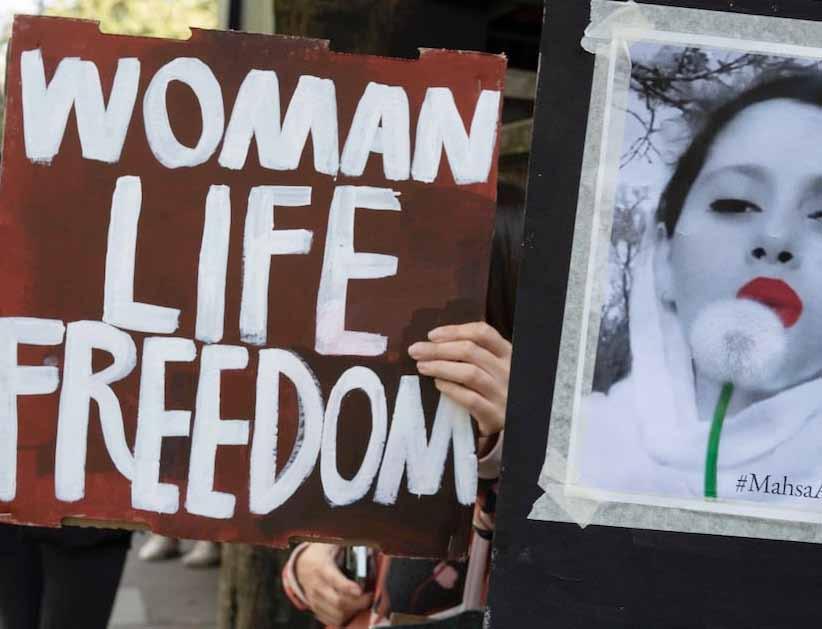
scarf law.
The protest movement in Iran is growing in terms of its intensity and its expansion. Hundreds of thousands of Iranians from all walks of life are chanting “Death to the Dictators” and “Women, Life, Freedom.” The latter emerged from the Kurdish liberation movement and was adopted
14 14/10/22
over
C The Mullahs go Mediaeval (Again!)
People demonstrate opposite the Embassy of Iran in Kensington to protest the death of Mahsa Amini, the 22year old Kurdish woman who died while in police custody in Iran/Jenny Mathews via Getty Images
by the Iranian protest movement. In Iran, the slogan was first chanted at Amini’s funeral on Sept. 17 in the Kurdish town of Saqqez, and since then has been recognized globally as the banner of Iran’s Uprising.
However, this feminist slogan pre-dates the current events unfolding in Iran. In April 2013, in Turkey, during the congress of wom en’s branch of Peace and Democracy Party, a Kurdish party with historical links to the Kurdistan Workers’ Party (PKK), the slogan was echoed during the conference.
Without a doubt, the Kurds have been the most vocal and continuously opposed to the Iran-Mullah regime and towards the Iranian national identity which the state has tried to impose on them for decades. More than any other Iranian citizens they have endured a sys temic state oppression, resulting in the death of more than 10,000 Kurdish men and women and other serious human right abuses such as torture, long-term imprisonment, executions of Kurdish intellectuals and suppression of cul tural and human rights activities. In defiance of all of the persecution, Kurdish civil society did not relinquish its national consciousness. In Kurdish towns and villages Kurds publicly displayed Kurdish flags, playing banned Kurd ish music and songs about murdered political Kurdish leaders, and celebrating Kurdish New Year, Newroz.
There are several features making this uprising unique in comparison to previous ones. It is broad-based with all layers of society joining in, including ethnic and religious minorities. The mood is revolutionary – people are not calling for reforms but rather regime change.
The protesters are also braver and bolder and attacking the very symbols of the Islamic re gime. It is not insignificant that it is the Kurd ish-DNA that runs deeply, from the death of Amini, to the protests spiralling out from the Kurdish region, to the rest of Iran and finally to an old Kurdish slogan that unifies the current protest movement in Iran.
The level of women’s freedom determines the level of freedom in society at large – Abdullah Öcalan

Who thought that a Kurdish mantra associated with Abdullah Öcalan and the PKK would be
come the rallying cry of the Iranian Uprising?
Jin, Jîyan, Azadî means “Women, Life, Free dom.” The word Jin in Kurdish means “wom en” and comes from the root Jiyan meaning “life.”
The Kurdish people are proud that Jin Jiyan Azadi serves as a starting point and a catalyst for the protests against fascist government in Tehran and shows Kurdish unity with the Per sian people as well as the other minority eth nic groups in Iran. The people of Iran should stand undivided against the clerical cabal that is suppressing them.
For decades there has been a debate among Kurds about the role of women in Kurd ish society and in the struggle for independ ence. “Women, Life, Freedom” emphasizes the women’s liberation character and genderequality which emerged as form of feminism in Kurdish heritage. Recently, this was further developed by Öcalan, the imprisoned Kurdish leader and founder of Kurdistan Workers Party (PKK), a fierce opponent of the medieval pa triarchy and an advocate for women’s rights. The PKK’s Women Liberation Division states that its platform is built on the principle that without the freedom of women within society and without a real consciousness surround ing women no society can call itself free. For years the slogan was in used by members of the Kurdish women’s movement, a part of the Kurdish freedom movement which was found ed on grassroots activism in response to perse cution of Kurds by the regimes of Iran, Iraq, Turkey and Syria.
Öcalan has written extensively on the topic of equality and women’s rights. In his book “Lib erating Life: Women’s Revolution” (2013),
15 14/10/22
“Women, Life, Freedom” emphasizes the women’s liberation character and gender-equality which emerged as form of feminism in Kurdish heritage.
over story
Öcalan writes: “The extent to which society can be thoroughly transformed is determined by the extent of the transformation attained by women. Similarly, the level of woman’s freedom and equality determines the freedom and equality of all sections of society (…) for a democratic nation, woman’s freedom is of great importance too, as liberated woman con stitutes liberated society. Liberated society in turn constitutes democratic nation. Moreover, the need to reverse the role of men is of revo lutionary importance.” For Öcalan “the level of woman’s freedom determines the level of
freedom in society at large.” In practical terms, Öcalan’s political theories specifically on the role of women have been the cornerstone of the ideology of the Demo cratic Union Party (PYD) and People’s Pro tection Units (YPG), in which women made up 40% of the Kurdish Peshmerga fighting the Islamic State of Iraq and Levant (ISIL). In Rojava, the Kurdish de facto autonomous region in northern Syria, a social revolution took place in a normally traditional conserva tive and patriarchal Middle East. The phenom ena of female fighters exist in all four parts of Kurdistan (Iran, Syria, Iraq and Turkey). Majalla approached Kurdistan Freedom Party (PAK) to comment on the use of the slogan by Iran’s protest movement. An official told us that “The Jin, Jiyan, Azadi slogan was created for something totally different than what’s go ing on now.” The official continued saying, “We believe such slogans may narrow the protestor’s belief that they could change some thing (…). The matter is bigger than only Jin Jiyan Azadi. As words and as a term we have no problem with using it and we do use it in fact to support some but not all of the goals of our protests.”
Protests across the world have taken place since the death of 22-year-old Iranian Mahsa Amini on Sept. 16. (Photo by Taymaz Valley)

16 14/10/22
“Some of the martyrs are buried secretly inside gardens of their houses so IRGC do not take the bodies or do not kidnap the family of the victims,” PAK official tells Majalla.
C
A member of the District of Columbia’s Kurdish community demonstrates in front of the White House in Washington, Saturday, Oct. 1, 2022, after the death of Mahsa Amini. (AP Photo/Cliff Owen)
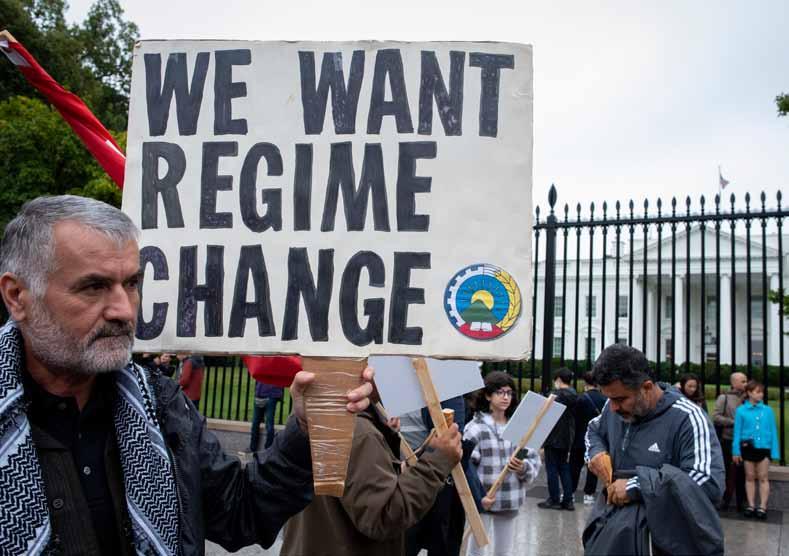
The official continued, “PAK serves all Rojha lat in the previous and current situations. PAK is a real supporter of women in Rojhalat. We have a special unit of Peshmerga forces that is made of strong women.” The official told Ma jalla that since the recent unrest started, more people are joining PAK. The new recruits feel that, “PAK is the place where they can breathe freely.”
Iran Toughens its Crackdown as two New In tense Battles Open up According to rights groups, at least 200 peo ple including more than 20 minors have been killed and thousands have been arrested. Hen gaw – an Iran based Human Rights Organisa tion reported that the worst atrocities are com mitted in the Kurdish and Baluchi provinces where at least 90 deaths have been reported in Zahedan, Baluchistan.
Rights groups have reported that Sanandaj has become the latest killing zone amid worsening state violence. They continue saying that Iran’s security forces are shooting directly at protest ers and using tear gas in the Kurdish cities of Sanandaj and in Amini’s hometown of Saqqez. Hengaw reports that more than 100 military
vehicles full of Special Forces are moving from Hamedan to Sanandaj. There are fears that the Iranian regime is preparing for a ground as sault on the Kurdish region. A Hengaw official said, “given the recent military activity and the movement of advanced artillery close to the border, there is a possibility of a ground inva sion with air support targeting the headquarters and camps of the Iranian Kurdish opposition parties.”
Hengaw provided Majalla with a detailed re port listing the names of those who have been killed in the Kurdish region. The following are the figures for the past three days of protests (up to Oct. 11): “at least five civilians were killed, two detainees were tortured and mur dered, and over 400 people were injured as a
17 14/10/22
The total death toll for the Kurdish region currently is 32, with1541 injured and over 2500 Kurdish protesters been arrested.
over story
result of machine gun fire and other violence perpetrated by government forces during pro tests in Kurdistan throughout the past three days.”
On Wednesday, 12 October, Iran’s version of the Gestapo, namely the Islamic Revolutionary Guard Corps (IRGC), allegedly opened fire on “schoolgirls” chanting anti-regime slogans on Wednesday.
Staggering Numbers in the Kurdish Region
The total death toll for the Kurdish region cur rently is 32, with1541 injured and over 2500 Kurdish protesters been arrested. The Hen gaw official continues: “It should be noted that
many of the detainees were severely tortured and at least two of them died under torture in the cities of Urmia and Saqqez.” Most of the victims are from Sanandaj, Saqqez, Mahabad and Kermanshah.
Hengaw told Majalla, that Dr. Ramin Ne shasteh from Saqqez, who was treating injured people, was detained and taken to an unknown place by the Iranian security forces on Oct. 10. The Center for Human Rights in Iran (CHRI) said in a statement on Oct. 11: “The ruthless killings of civilians by security forces in Kurd istan Province, on the heels of the massacre in Baluchistan Province, are likely preludes to severe state violence to come,” said CHRI Ex ecutive Director Hadi Ghaemi.
Widespread strikes are also taking place in Saqqez, Diwandareh, Mahabad, and Sanandaj. Meanwhile, protests also continued in other locations across the country including Tehran, Karaj, Esfahan, Shiraz, Kerman, Mashhad, Ta briz and Rasht.
The official from PAK tells Majalla, that the death toll is much higher, as “Some of the mar tyrs are buried secretly inside gardens of their houses so Iran’s Revolutionary Guards do not
This grab taken from a UGC video made available on the ESN platform on October 10, 2022 shows Iranian students chanting slogans as they protest at Tehran’s Amirkabir University of Technology.
(Photo by ESN / AFP)
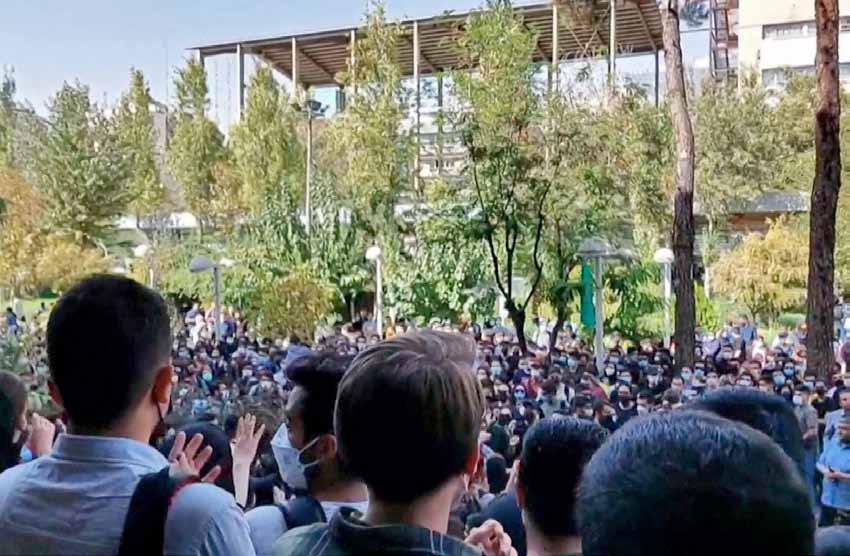
18 14/10/22
“There is a possibility of a ground invasion with air support targeting the headquarters and camps of the Iranian Kurdish opposition parties.”
C
A Kurdish peshmerga fighter affiliated with the Iranian Kurdistan Demo cratic Party (KDP-Iran) stands guard on a building following an Iranian crossborder attack in the town of Koye (Koysinjaq), 100Km east of Arbil, the capital of the autonomous Kurdish region of northern Iraq on October 1, 2022. (Photo by SAFIN HAMED / AFP)

take the bodies or do not kidnap the family of the victims.”
Solidarity Strikes Erupt in Oil-Producing Re gion of Khuzestan
While university students have played a major role in the protests with dozens of universities on strike, a new battleground has opened. Workers at Abadan in Khuzestan Province and Kangan oil refineries and the Bushehr Petrochemical Project have also joined in the protest movement.
On October 10, the following statement was posted on the Contractual Oil Workers Protest Organizing Council channel on Telegram: “To [all] our colleagues in oil, gas and petrochemi cal projects, in all refineries and petrochemi cals, in the oil platforms as well as the drill ing sites – we declare that now is the time for widespread protests and to prepare ourselves for nationwide and backbreaking strikes,” read the statement.
Videos shared online showed strikers in this critical industry chanting “Death to Khame nei,” as well as “Brave Iranians! We support you! We support you!”
At least 200 people, including 20 children, have been killed, thousands injured, and thou
sands have been arrested by the security forc es. Nevertheless, the Iranian regime is in total denial and blaming the protests on Iran’s for eign enemies ranging from the US and Israel to Saudi Arabia and armed Iranian Kurdish dis sidents living in Iraqi Kurdistan.
In 1979, precisely, 43 years ago, a combina tion of mass protests and strikes by oil workers and bazaar merchants brought down the rule of the Shah. However, the chance of success for the current revolution is quite slim, since the regime is determined to stay in power at any cost. The Iranian regime’s loyal elite forc es like the Revolutionary Guards, so far have been relatively restrained, but they could be mobilized quickly to unleash a brutal crack down. Kasra Aarabi, the Iran program leader at the Tony Blair Institute for Global Change, said that if the protests persist, the regime will use “unrestrained violence against unarmed ci vilians to quash the protests this time around.” Aarabi continued saying “of course, no one can predict when this moment will happen [re ferring to the fall of the regime], it could be weeks, months or even years (…) But the Ira nian people have made up their mind.”
19 14/10/22
Politics
Putin’s Apocalyptic End Game in Ukraine
Annexation and Mobilization Make Nuclear War More Likely
By Tatiana Stanovaya
On September 30, following a series of sham referendums held in occupied territory in Ukraine, the Russian government declared that four Ukrainian regions were now of ficially part of Russia. The annexation came amid a “partial” Russian mobilization that is
in fact rapidly becoming a large-scale one and that has left many Russians aghast and anx ious. With these moves, the war in Ukraine has entered a new stage in which the stakes have risen drastically.
Russian President Vladimir Putin is explicitly demonstrating that he is going to do whatever it takes to win, even at the risk of undermin
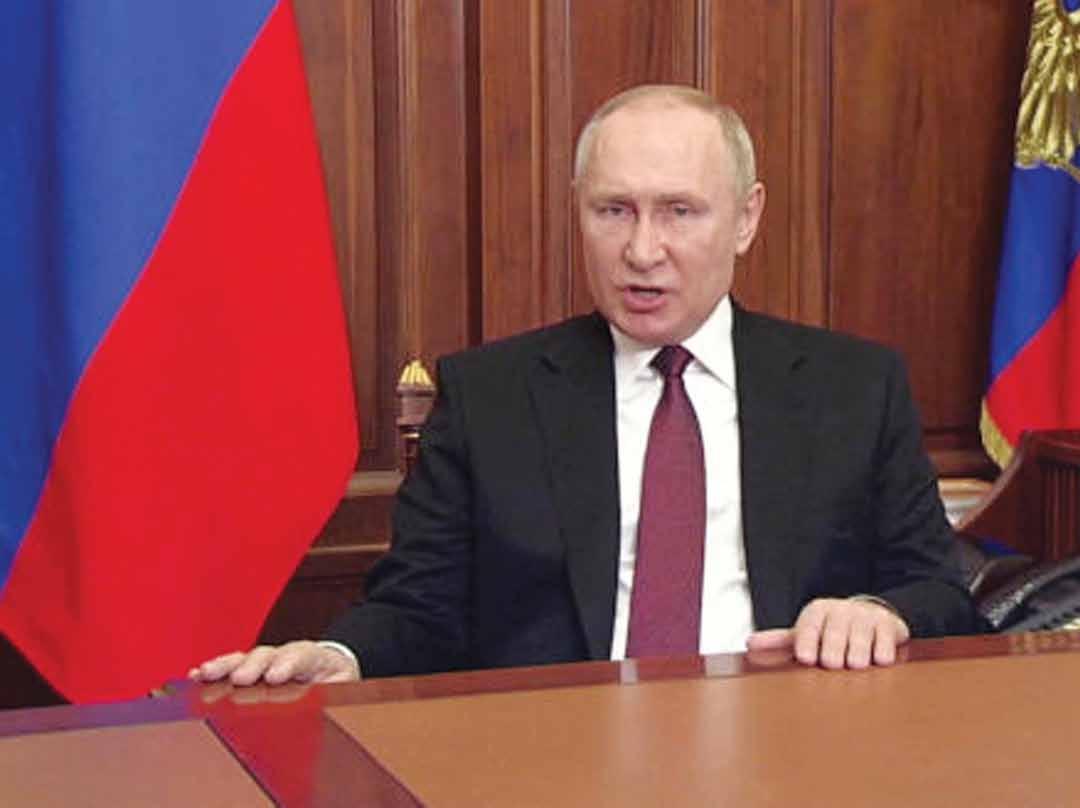
20 14/10/22
Russian President Vladimir Putin speaks about authorising a special military operation in Ukraine’s Donbass region during a special televised address on Russian state TV, in Moscow, Russia, February 2022 ,24, in this still image taken from video. Russian Pool/via REUTERS TV
ing his own regime. Blindly believing in his own rectitude, Putin may resort to nuclear weapons if events in Ukraine continue to confound his ambitions. The key question is whether Russia’s elites and broader soci ety are prepared to accompany their presi dent on this journey to hell, or if Putin, in doubling down on his disastrous gamble in Ukraine, has only paved the way for his own end.
A NOT-SO-GRAND ULTIMATUM
Ukraine’s counterattack, launched at the end of August, has completely changed Putin’s calculations regarding how Russia should fight. His previous plan, based on the idea that Kyiv would not dare to carry out a full-fledged offensive on Russian positions, presumed that the Kremlin had plenty of time to establish itself in the territory it had occupied, while the Ukrainian government, exhausted by the war and with the economy in ruins, would sooner or later have to ca pitulate.
The strategic part of Putin’s plan remains the same. It envisages that Kyiv will fall, since his paramount purpose in this war is still to put an end to what he sees as the “anti-Russia” geopolitical project managed by the West and secure a long-term Russian presence on Ukrainian territory. The tactics Putin will use to achieve this goal, however, have been fundamentally revised. The mili tary threats to Russian positions in Ukraine, based on the Kremlin’s miscalculations, have reached the point where the Kremlin has effectively issued an ultimatum to the world: either Russia wins Ukraine or it will resort to nuclear escalation. This ultimatum has three major parts. The first is declaring stretches of Ukraine to be Russian territory. The annexation of four regions—Luhansk, Donetsk, Kherson, and Zaporizhzhia—means that Russia has artifi cially transformed its war to destroy Ukraine as an independent state into a war of selfdefense against foreign military forces. The annexation is a form of protest against West ern involvement in the Ukrainian conflict. It frames the West’s military aid to Ukraine as
tantamount to aggression against Russia. By annexing these territories, Putin is sending a blunt message: continuing to help Kyiv will inevitably lead the West into a direct conflict with Russia, something he believes Western capitals would like to avoid. This move also reflects another important shift in the Kremlin’s understanding of the current situation. Before Kyiv’s counteroffensive, Moscow did not believe that Western aid could drastically change the balance of forc es and create conditions in which Ukraine would threaten Russia militarily. Now, it does.
NUCLEAR BLACKMAIL
Another plank of Putin’s ultimatum is the nuclear option, which is now squarely back on the table. After cooling his rhetoric over the summer, Putin has returned to invok ing this ultimate threat as a way to influ ence Western policy on Ukraine. In April, when Russian forces retreated from failed offensives against Kyiv and Chernihiv, the Kremlin turned to nuclear blackmail, with Putin suggesting that his government was willing to allow the use of nuclear weapons “if necessary” and effectively blaming the West for Russian failures. By May, how ever, that language had died down; Putin had concluded that even with Western as sistance, Ukraine was doomed to lose even tually.
With the Russian military struggling, com mentators and officials are once again ad vocating the use of nuclear weapons in Ukraine. They have filled TV screens and social media with nuclear saber rattling. The pro-Kremlin segment of Telegram, a Rus

21 14/10/22
Blindly believing in his own rectitude, Putin may resort to nuclear weapons if events in Ukraine continue to confound his ambitions.
Politics
sian information-sharing app, is buzzing with hundreds of posts justifying Moscow’s legitimate right to use tactical nuclear weap ons in Ukraine or trying to convince the world that Putin is seriously ready to resort to nuclear weapons in the event of further escalation. The profusion of posts insisting that “Yes, he can,” “he must,” and “he will” is not only part of a deliberate campaign to intimidate the West but also a demonstra tion of the growing determination among
the most committed, ambitious pro-war ele ments of Russia’s elite and society that the war must be won no matter what. Whether or not Putin is bluffing, the threat of using nuclear weapons creates higher expectations among the elites about how far Putin is prepared to go, and it dramati cally reduces room for maneuvering in a hypothetical future political bargain over Ukraine. To take the nuclear card off the table, Putin would need to see the success ful military advance of Russian forces com bined with signals from Washington that the West will shrink its role in the conflict. If these demands are not met—and it is safe to say they will not be—Russia will resort to the nuclear option: such is the new reality that Putin seeks to shape, in effect taking the world hostage.
TOTAL WAR
Having raised the stakes through his an nexation of Ukrainian regions and his invo cations of nuclear war, Putin further upped the ante by making ordinary Russians part of the war. His mobilization order in Sep
Russian recruits take a train at a railway station in Prudboi, Volgograd region of Russia, Thursday, Sept. 2022 ,29. Russian President Vladimir Putin has ordered a partial mobilization of reservists to beef up his forces in Ukraine. (AP Photo)
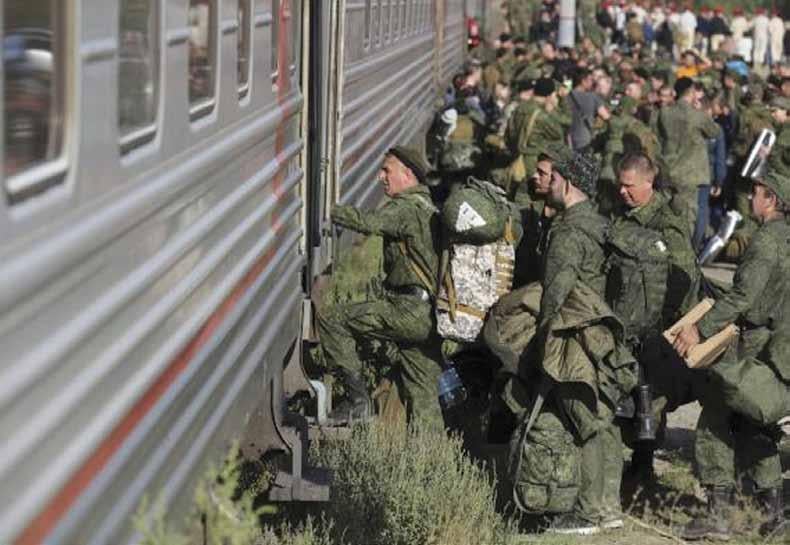
22 14/10/22
Putin would fight for “historical justice” against Ukrainian “Nazis,” relying on “professionals” and volunteers to avert the strategic threats posed to Russia by the West’s involvement in Ukraine.
tember caught Russians off-guard. Over the summer and in the first half of September, polls recorded an uptick in the positive mood among Russian society, growing fatigue with military rhetoric, and declining inter est in the war in Ukraine. Although the prowar part of the establishment, together with the military, demanded that Putin announce a mobilization as soon as possible, those in the presidential administration who oversee domestic policy had tried to minimize the war in the minds of the public. They sought to calm the angry jingoists who were advo cating for Moscow to take Kyiv. Now, mo bilization has irretrievably changed the lives of millions. In the latest Levada Center poll of Russians, 47 percent of respondents said that the partial mobilization made them feel “anxiety, fear, and horror,” 23 percent felt “shock,” and 13 percent felt “anger and in dignation.” Only 23 percent said they felt “pride in Russia.” Even if the mobilization has not prompted mass protests, it has un dermined the public’s trust in the state and state media.
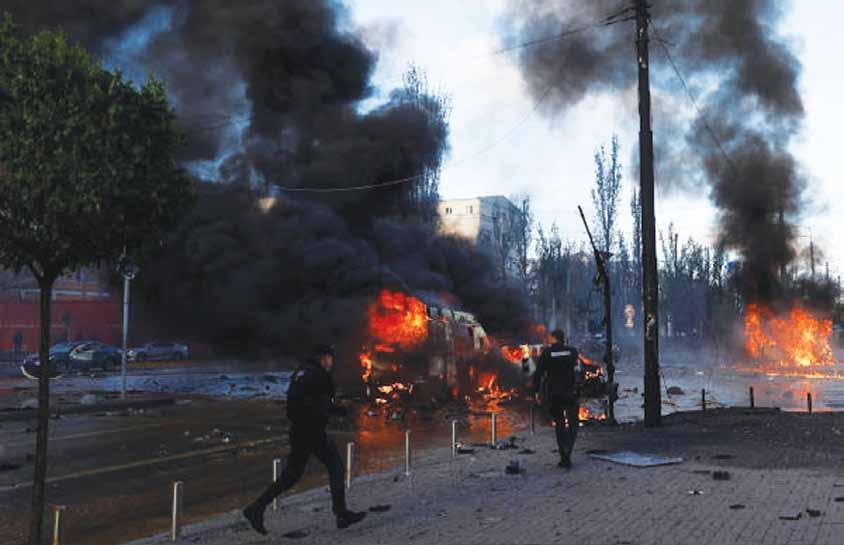
Beyond the question of how the mobiliza tion will affect domestic affairs, this dras
tic political decision reveals much about Putin’s priorities. The president has dared to announce what looks to be the most un popular political decision in his 22 years of rule, regardless of how mass conscription will stoke anger, resentment, and social ten sions and threaten domestic political stabil ity. This decision puts in doubt any further social consolidation between the authorities and ordinary Russians over the war. Until recently, the majority of Russians ac cepted the deal offered by the Kremlin: Putin would fight for “historical justice” against Ukrainian “Nazis,” relying on “profession als” and volunteers to avert the strategic threats posed to Russia by the West’s in volvement in Ukraine. This goal found sig
23 14/10/22
The president has dared to announce what looks to be the most unpopular political decision in his 22 years of rule.
Cars are on fire after Russia’s missile attack in Kyiv, Ukraine October 2022 ,10 REUTERS/Valentyn Ogirenko
Politics
nificant social support, but on one important condition: that Russia fought without the di rect involvement of ordinary Russians, who have been living their lives more or less as usual since the invasion began. Mobilization has ripped up this contract. Having chosen mobilization despite the predictable pub lic anger, Putin has shown that if it comes to a choice between achieving his goals in
Ukraine and placating Russian society, Pu tin will opt for the former, sacrificing popu lar support at home for geopolitical victory in Ukraine. It is an explicit rebuttal to those who have suggested that Putin’s fear of a collapse in his political support among Rus sians would stop him from taking risky deci sions. In truth, he is single-mindedly driven to turn his gamble in Ukraine into a victory, whatever the cost.

THE POISON PILL
Putin’s nuclear ultimatum and mobiliza tion order put significant pressure on both Russian society and the increasingly nerv ous Russian elites, who must decide which losing scenario is less tragic: to accompany the furious leader until the end of the world, to escape both Putin and the retribution of the West, or to wait for Russia to lose. It puts Putin in an unprecedentedly vulner able position. Most of the Russian elite does
24 14/10/22
Beyond the question of how the mobilization will affect domestic affairs, this drastic political decision reveals much about Putin’s priorities.
Ukrainian soldiers fire, on the front line in the Kharkiv region, Ukraine, Wednesday, Oct. ,5 2022. (AP Photo/Andrii Marienko)
not share his obsession with Ukraine to the same extent, and much of his own elector ate does not share his readiness to sacrifice thousands of Russian lives. He appears to be pushing a scenario in which he is the only one who has the capacity to pay what ever price it takes, to fight under the banner of “all or nothing.” The president’s manic course of action carries a distinct and bitter taste of suicidal exasperation. But it would be wrong to think that it cannot get any worse. At this stage, however cor nered Putin may seem, he still believes he can win. In his eyes, the mobilization should help the Russian army drive out Ukrainian forces from the newly annexed territories and convince the West to step back from Ukraine, leaving Kyiv doomed to surrender and opening the opportunity for the Russian government to establish some facsimile of normal life in the new regions.
So what happens when things don’t go according to plan once again? What hap
pens when Russian forces fail to defeat the Ukrainians, the West increases its military aid and demonstratively ignores Putin’s blackmail, and people in the new territories continue to resist their Russian occupiers, targeting senior officials and administra tive buildings in terrorist attacks? Then the pivotal moment will arrive when the only option Putin sees available to him is the nu clear one. It will also be a decisive moment for the Russian elites who still do not dare to countenance this worst-case scenario, some thing that many today avoid thinking about. Domestic political conditions may be reach ing the point where senior officials would dare to disobey, speak out louder, and fight with each other more resolutely. Ukraine may become a poison pill for Putin: in seek ing to swallow it, he is dooming himself to defeat.
This article was originally published by Foreign Affairs.

25 14/10/22
A view shows a fire on the Kerch bridge
at
sunrise
in the
Kerch Strait,
Crimea, October 2022 ,8. REUTERS/ Stringer
Politics
Win-Win Historic Agreement
Maritime Demarcation Deal Brings Truce and Stability to Lebanon, Israel
By Suha Jaffal – Beirut
The demarcation of the southern maritime borders between Lebanon and Israel is at the fore of Lebanon’s domestic scene following a breakthrough development that saw the two parties agreeing to the American written proposal on a win-win basis.
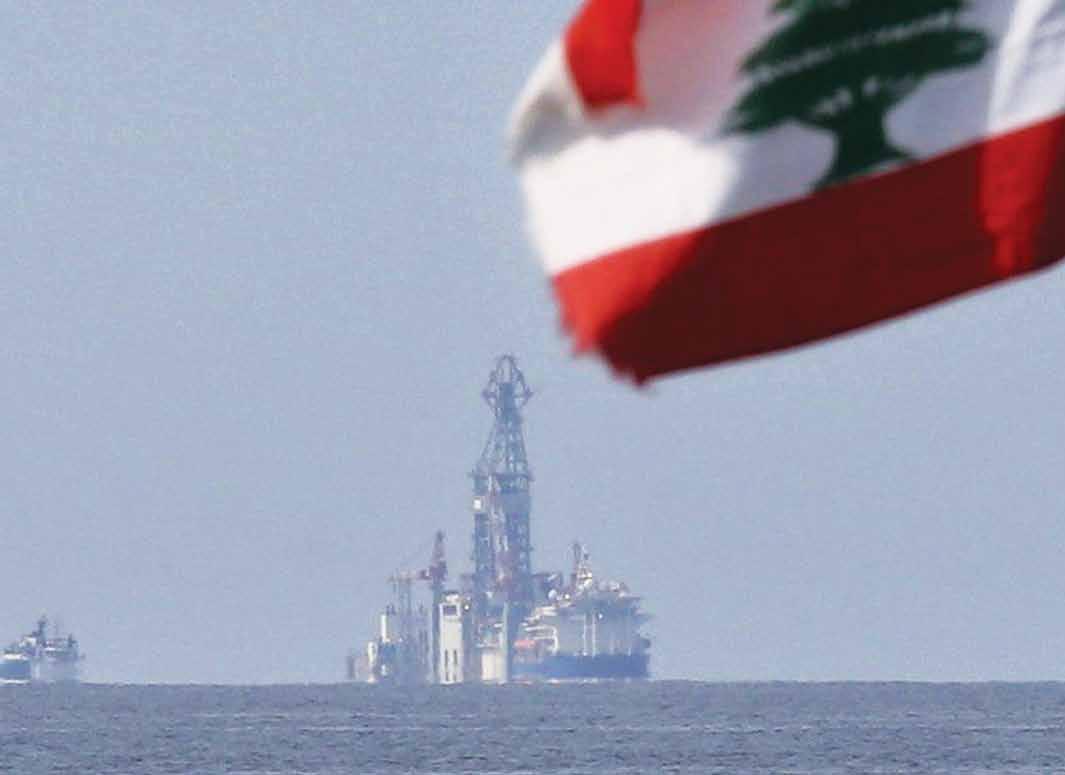
This follows months of shuttle diplomacy between Beirut and Tel Aviv by the US mediator Amos Hochstein and the accompanying escalation in the conflict between
Israel and Hezbollah that almost toppled what had been achieved.
After deliberation, negotiations for the demarcation of maritime borders were concluded amid a positive atmosphere with US President Joe Biden describing the deal as a «historic breakthrough.»
On Tuesday evening, Biden called Lebanese President Michel Aoun, and Israeli Prime Minister Yair Lapid to «celebrate.»
26 14/10/22
This indicates the importance of the role played by the US administration in concluding this agreement, which will constitute a major push for its plans in the coming period, especially in the battle of sanctions against Russia and the reduction in Russian gas supplies due to the war on Ukraine.
Lebanese officials announced that the final version of the offer satisfies Lebanon and meets its demands. The final amended official version of the proposal drafted by the American mediator was received by Deputy Speaker Elias Bou Saab last Monday evening and also handed to Aoun.
Aoun confirmed that the deal “preserved Lebanon›s rights to its natural wealth at an important time for the Lebanese.”
This also comes at a time when caretaker Prime Minister Najib Mikati asked the representatives of Total to immediately start implementing the standard procedures for exploration in Lebanese waters.
IN ISRAEL
In addition, it was announced in Israel that Biden and Lapid confirmed during a telephone conversation that «the agreement demarcating the maritime borders with Lebanon will guarantee Israel›s security.»
Lapid said that the agreement with Lebanon is a historic achievement that will enhance Israel›s security, inject billions into the Israeli economy and ensure the stability of the country’s northern borders.
US Ambassador to Lebanon Dorothy Shea congratulated the Lebanese people on the achievement of the maritime demarcation with Israel, and everyone who played a constructive role in the negotiations. She stressed that this agreement will enhance foreign investment in Lebanon, and this will be fundamental to the tragic situation in the country.
Shea pointed out in a speech from the embassy that Lebanon can count on development in the field of energy and natural resources, which will be open to import and export, and that it is important for everyone to abide by their commitments.
AMERICAN PRESSURE
After the setback that dislocated the agreement last week and toppled the positive atmosphere, sources following up on the issue confirmed to Majalla that “there is
enormous American pressure to pass the agreement, reaching the limits of persuasion with Netanyahu to ease the pressure on Lapid, accompanied by shuttle contacts with Lebanese officials.”
They also noted that the agreement was achieved on the basis of the two parties’ declaring that the final paper fully meets their aspirations and desires, up to the point of considering it a historic victory for both.
The same sources also referred “to getting out of the bottleneck, in the sense that the demarcation may open the door to integrated solutions to the Lebanese crises, starting with the election of a new president, leading to a softer arrangement with the IMF.”
Lebanese officials are counting on this agreement to get out of the economic crisis that has continued for three years. If things go as they should, Lebanon will thus enter the club of oil states at a time when global demand for gas and oil is increasing due to the repercussions of the war in Ukraine, and threats that Europe will be experiencing a harsh winter in light of its need for energy resources that will not available in the foreseeable future.
THE CONTENT OF THE AGREEMENT
Amid the official Lebanese secrecy regarding the terms of the agreement, sources familiar with the demarcation file stated that, “Lebanon obtained in the agreement what it was demanding, i.e., Line 23, in addition to the Qana field, without deducting any part of the Lebanese oil blocks (9 ,8 and 10). In exchange, Israel would keep the entire Karish field.”
In addition, Israeli media published the terms of the agreement, which were leaked by Israeli sources, according to the Israeli Prime Minister’s Office:

27 14/10/22
After deliberation, negotiations for the demarcation of maritime borders were concluded amid a positive atmosphere with US President Joe Biden describing the deal as a «historic breakthrough.»
Lebanon proposes amendments to the southern maritime border demarcation agreement
Politics
* The maritime border line between Israel and Lebanon is recognized and there will be no demands to change the line unless another future agreement is reached between the two parties.
* After the buoy line, the maritime line will be based on Line 23 (the future maritime boundary between the two countries).
* Israel will receive financial compensation for the revenues of the Qana reservoir, according to its negotiations with the French company Total.
* Israel will receive guarantees from the US government confirming Washington›s commitment to all its security and economic rights, in the event that Hezbollah or another party decides to challenge the agreement regarding the demarcation of the maritime border with Lebanon.
* The guarantees include defending Israel and protecting
its economic rights in the Qana reservoir, in addition to preventing the reservoir’s revenues from reaching Hezbollah in accordance with the existing sanctions scheme in the United States.
NO AGREEMENT, BUT ARRANGE MENTS FOR GAS EXTRACTION
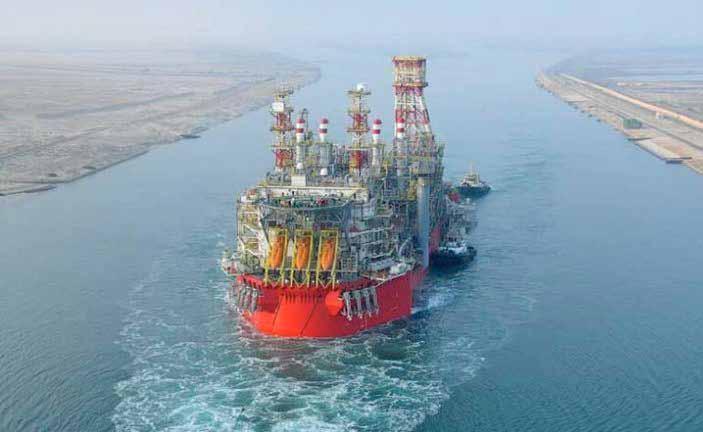
In this context, the former head of the Lebanese delegation negotiating the maritime borders, Major General Abdel Rahman Sheheitly, said that “the agreement was signed, but so far it is just arrangements for gas extraction between the two parties.”
“Therefore, it did not live up to the level of the border agreement, which is reflected in the statement of Deputy Speaker of Parliament Bou Saab who confirmed that there is no treaty between the two parties and that Lebanon agreed to the paper that was presented to it in a decisive indication that there is no border agreement or a direct deal on the demarcation of the maritime borders.”
Sheheitly explained in an interview with Majalla that what is happening are arrangements that allow the two parties to benefit economically from the extraction of gas and oil north and south of the Hochstein line.
He added that «until now, no party has confirmed that the Hochstein line completely coincides with Line 23.”
28 14/10/22
“There is enormous American pressure to pass the agreement, reaching the limits of persuasion with Netanyahu to ease the pressure on Lapid, accompanied by shuttle contacts with Lebanese officials.”
Karish gas field
A UN peacekeeper (UNIFIL) vehicle drives near signs bearing names of cities, in Naqoura, near the LebaneseIsraeli border, southern Lebanon, October ,11 2022. REUTERS
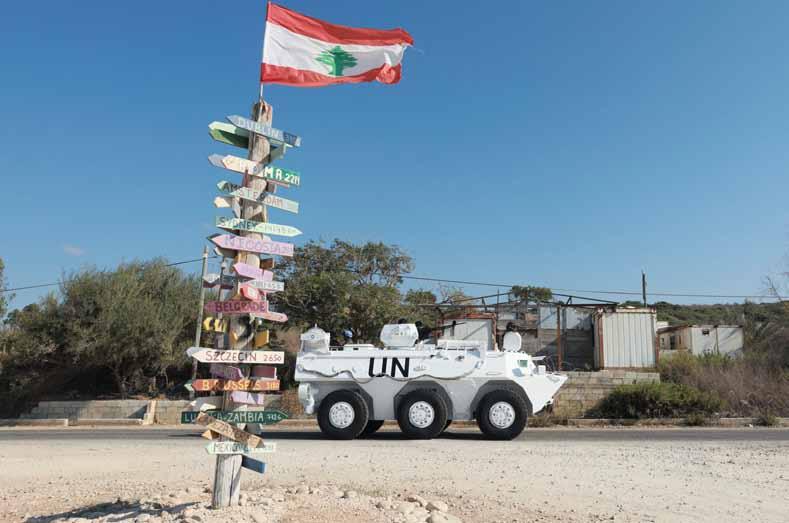
“This means that we are in front of a new Blue Line that Lebanon respects on the one hand and Israel respects on the other, similar to the land line.”
Sheheitly added that the United States succeeded in getting each side to achieve its demands through these arrangements.
He pointed out that «Article 74 of the International Law of the Sea states that if an agreement is not reached between
the conflicting parties within a reasonable period, those parties must resort to temporary arrangements that allow them to benefit economically from the disputed areas until a final agreement is reached.»
As for the Israeli confusion regarding the amendments requested by the Lebanese side to the agreement, Sheheitly said that “it was clear that it would not have a negative effect because Israel does not have a second option.
“Their fields and their security are otherwise threatened, while if the agreement is concluded, it means that Israel and Lebanon are both winners in terms of starting to extract oil and gas from all Lebanese fields north of Line 23, as well as the Qana field with all its assets for the Lebanese side after waiting 12 years.”
LEBANON IS FACING A NEW HISTORY
He pointed out that «in the event that the French Total company began to work and explore directly as soon as the agreement was announced, as is rumored, this means that Lebanon has become covered to a large extent in economic terms, and thus begin attracting investments.»
He added: “If oil and gas exploration and extraction operations begin, this means that Lebanon is facing a new history, especially since Lebanon has field No. 4 that was recently discovered and can start investing immediately,

29 14/10/22
Political analyst and journalist Mounir Al-Rabee
Politics
while the rest of the fields are promising fields.”
He also noted that it is a very positive and very important thing for Lebanon, even if it does not rise to the level of a border treaty, and this does not harm Lebanon at all.”
Sheheitli also indicated that “it is expected to sign the minutes of a meeting within a framework agreement in Naqoura under the auspices of the United Nations stipulating respect for the Hochstein line on both sides.”
He noted that “this will entail that each country will take certain steps, as Israel will face more steps in terms of withdrawing its declaration.”
Line 1 registered with the United Nations requires the approval of the Israeli government, as well as an agreement between Israel and Cyprus on Line 1 and Line 23, which was concluded in the Israeli Knesset and requires an amendment with the Cypriot side.
It is a big issue in Cyprus since Lebanon is not required to take major constitutional steps, as is required from the latter.
BORDER AGREEMENT AND SECURITY
But will this agreement prevent any military development in the south? Sheheitly said, «Any economic agreement is supposed to include security protection that encourages companies to invest because any security threat would topple them.»
A STRATEGIC SHIFT FOR LEBANON
Reaching an agreement to demarcate maritime borders would facilitate the exploration of oil resources within Lebanon›s territorial waters. The Lebanese authorities are counting on the presence of oil reserves that would help the country to overcome the catastrophic repercussions of the prolonged economic collapse for nearly three years.

Lebanese President Aoun indicated earlier that Total is ready to cooperate with Lebanon in exploration as soon as an agreement is reached, pointing out that he has been keen over the past months to “guarantee Lebanon’s rights to its waters and provide the appropriate conditions to start exploration operations in the fields.” The oil and gas sector specified is the exclusive economic zone in which the French company Total is supposed to start.
In this context, political analyst and journalist Mounir Al-Rabei indicated that «Lebanon sent some amendments to the American proposal related to the security zone,
Local fishermen›s boat passes through Corniche Al Manara in Beirut, Lebanon, 11 October 2022. The Lebanese Presidency Press Office said in a statement on 11 October Lebanon received the final modified official version of the proposal that was submitted by American mediator Amos Hochstein on maritime borders. The presidential office described the final draft as satisfactory to Lebanon. / EPA
30 14/10/22
“The agreement was signed, but so far it is just arrangements for gas extraction between the two parties.”
Lebanese Deputy Prime Minister and lead negotiator Elias Bou Saab (R), hands the final draft of the maritime border agreement between Lebanon and Israel to President Michel Aoun at the Presidential Palace in Baabda. After decades of wrangling, Israel and Lebanon have agreed on a common maritime border in the Mediterranean, Israeli Prime Minister Yair Lapid said. Photo: -/Dalati & Nohra/dpa
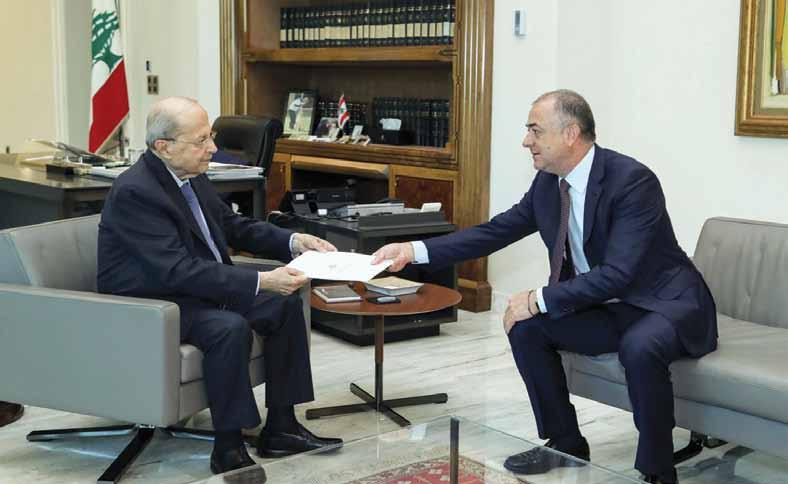
which it rejects, and refuses to pay compensation to the Israelis.»
He pointed out in an interview with Majalla that «despite the fact that the internal Israeli political conflict nearly toppled the agreement, there is great American pressure to pass it.»
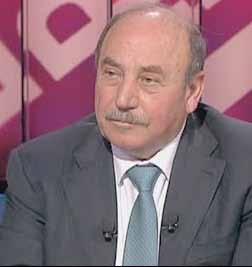
He believed that «this agreement is a strategic shift for Lebanon because it will lead to an agreement related to the extension of stability in the south, which means that Hezbollah in one way or another recognized the demarcation of the borders, meaning that it recognized the borders of Israel, which means that Lebanon and Israel entered into a state of armistice.»
Al-Rabee said that “it can be considered that Lebanon achieves a benefit of stability, and the second benefit is the exploration and extraction of gas. However, a basic question arises later, which is how this gas will be exported.”
He explained, “There are some options, either through the Egyptian pipeline used by Israel as well, or transporting by oil tankers or selling gas to the excavating company.”
On the ability of this agreement to get Lebanon out of the economic crisis, Al-Rabie said that “the process of exploration and oil extraction needs six to seven years, and Lebanon cannot tolerate this time frame, even if oil is extracted tomorrow. The process will not be workable as long as there is no reform plan or a clear economic program together with a consistent and capable political authority to restore confidence as well as relations with the Arabs and the West.”
“Without that, gas will not lead to economic reform because it will not be in the interest of the existing political forces seeking to prolong their existence.”
Lebanon and Israel are quarreling over an territory that is rich in oil and gas in the Mediterranean Sea with an area of 860 square kilometers. The United States is mediating indirect negotiations between them to settle the dispute and demarcate the border.
The former head of the Lebanese delegation negotiating the maritime borders, Major General Abdel Rahman Sheheitly
Negotiations between Lebanon and Israel started in 2020, then stopped in May 2021 due to differences over the area of the disputed area.
31 14/10/22
Economy
Towards A New Energy World Order
Oil markets and OPEC+ decisions are of common interest to everyone
By Ahmed Taher
It is not a new decision that was taken by the OPEC+ bloc, (which includes member states of the Organization of the Petroleum Exporting Countries and other major oil-producing countries in the world, includ ing Russia), at its ministerial meeting held on the fifth of October 2022. The meeting was headed by Prince Abdulaziz bin Salman, Minister of Energy of Saudi Arabia and agreed to reduce production by two million barrels per day as of next November. However it sparked a global politi cal debate between two opposing viewpoints, each with its own prem ises, motives, goals, and interests. It came at a time when the United States and the European capitals saw it as a decision completely aligned with Russia, after the start of its military operation in Ukraine last Febru ary. On the other hand, the position of the bloc’s member states in terms of economic elements is based on a scientific study of the oil market and
its future trends.
Although this is not the first decision of its kind, it was preceded by sev eral decisions taken by the bloc which aimed at reducing the volume of production at a time when the energy market is facing many challenges. The majority of the policies are related to the prospect of events that will reduce demand for oil and thus the volume of production, and some are related to the extent to which producing countries require financing sources to meet their increasing needs. The bloc aims to do this without the need to pump more oil into the global market in order to achieve a profit margin for these countries’ economies. This will allow them to provide the necessary financial resources for their citizens’ development and lifestyle plans.
In light of these facts, this report examines the recent OPEC+ decision to reduce production in order to analyze the circumstances, consequences, and the positions of the parties. There are two main points that reflect
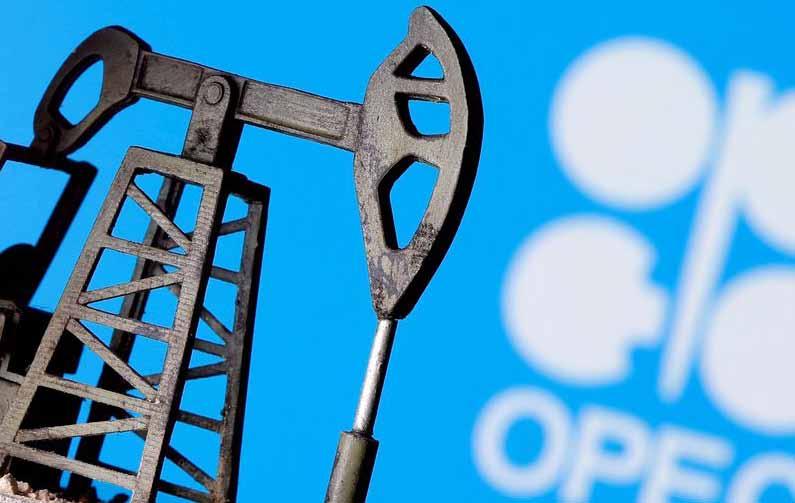
32 14/10/22
A 3D-printed oil pump jack is seen in front of an OPEC logo displayed in this illustration, April 14, 2020. REUTERS/Dado Ruvic/File Photo.
the stances of the crisis’s two sides (producers and consumers), as follows:
Reducing Production – An Economic Decision With No Politi cal Motivations:
It is not an exaggeration to say that, while oil is an economic commodity, it also has political dimensions that each party tries to exploit in order to further its own interests. Since its inception, the Organization of Petroleum Exporting Countries has been op posed to this in its orientations and policies and aims to maintain reasonable prices that take into account both sides of the equa tion (producers and consumers). This, in turn, is consistent with Saudi oil policy, which refuses to use oil as a weapon to balance the global landscape or harm any of the parties, as confirmed by Saudi Minister of State for Foreign Affairs Adel Al-Jubeir in an interview with Fox News, who stated: Oil is not a weapon. It’s not a fighter plane. It’s not a tank. You can’t shoot it. You can’t do anything with it. We look at oil as a commodity and we look at oil as important to the global economy in which we have a huge stake. The idea that Saudi Arabia would do this to harm the U.S. or to be in any way politically involved is absolutely not correct at all.
As a result, what is happening in the oil market today is not sur prising. Rather, the scenarios have been repeated for many years and are subject to the equation of supply and demand, which is inevitably affected by surrounding data and geopolitical condi tions, consistent with the free market. These factors include the Covid-19 pandemic and its effects on international and internal trade movement, the effects of the Russian-Ukrainian crisis, as well as the turmoil in gas and coal markets which increased their prices in exchange for a drop in oil prices. This was indicated by Saudi Energy Minister Prince Abdulaziz bin Salman in a state ment that: “Gas and coal prices have risen much more than oil prices in recent periods.” This rendered the OPEC+ decision an expression of the extent to which this bloc quickly responds to events and variables, as well as early preparation to face any fluc tuations in the markets, in order to ensure market balance and its future direction.
According to the Saudi Minister of Energy, who confirmed this in a press conference following the meeting: “The goal and mes sage of OPEC is to work on market stability to advance the glob al economy, amid expectations of a global economic recession caused by geopolitical ramifications that have nothing to do with oil market fundamentals. What we are doing is necessary for all oil-exporting countries, including those outside the Organization [OPEC +]. We will continue to honor our market commitments.”
This is reinforced by the fact that the recent decision to cut pro duction was based on careful and continuous monitoring of mar ket demand and supply, as well as collective efforts to achieve a balance. The reality indicated an economic slowdown in many developed and developing countries which would lead to a de cline in demand for oil. This decline was bolstered by decisions made by some countries to prohibit the use of combustion engine vehicles beginning in 2030, and a global campaign prevailed that
exaggerated the potential of sustainable energies to generate elec tricity instead of using petroleum. This will undoubtedly harm the economies of the oil-producing countries, especially in light of the obvious continuing rise in food and other primary com modity prices.

To confirm the above, the bloc’s decision came proactively to prevent the expected collapse in oil prices and not to support Rus sia in its war, and it also confirms that this is the approach taken by the organization in most of its policies. An example of this is the bloc’s decision in past June 2022 to increase oil production following the almost total European embargo on Russian oil and growing fears of a supply shortage in global markets. This was welcomed at the time by the United States and the West, and no one said that this decision was biased or politically directed to support the West in the face of Russia. In fact, it was economi cally based on expectations and fears of a supply shortage. This was unequivocally confirmed by the Secretary-General of the Or ganization of Petroleum Exporting Countries, Haitham Al-Ghais, who said: “The organization is not a political organization, and it does not take sides with one side against another ... and that the decision is based on numbers, and facts from many international parties, indicating a high probability of an economic recession, and that OPEC and the OPEC+ alliance decided to anticipate matters, based on past experience, and we make the most of it.”
US DOMESTIC FAILURES AND POLITI CAL MOTIVES
Despite the clarity of the position that ensuring the stability of oil prices and its products requires knowledge of the nature of investment in this industry, which is characterized as a sourceto-downstream industry, the US administration is deliberately attempting to ignore the facts in its truculent reaction to the de cision to reduce production. Assuming that that global public opinion is unaware of the reality of the situation, its difficulties, and the responsibility of each party involved, it is illogical to attribute the rise in oil prices solely to the decision to reduce production. Although this decision will undoubtedly affect price
33 14/10/22
“Although this is not the first decision of its kind, it was preceded by several decisions taken by the bloc which aimed at reducing the volume of production at a time when the energy market is facing many challenges.”
Economy
levels, it is not the only factor influencing the rise in prices, such as the American refining capacity which does not correspond to the amount of internal American gasoline consumption and does not parallel population growth. OPEC+ had previously warned of the dangerous impact of reducing investment in the industrial capability of supply to meet demand.
For example, the United States has faced a significant refining shortage for the past 20 years because it has not built refineries in decades. The failure of successive US administrations to build and develop new refineries resulted in insufficient domestic pro duction to meet the needs of the internal market, as well as the recent trend of the US to export to the European continent as a substitute for the halt in Russian supplies and to satisfy the thirst of the European energy market.
This attracted a portion of American production that was sup posed to be directed inward, with the goal of maximizing returns from energy exports in light of the nearly fourfold increase of prices borne by European treasuries, while also representing a
significant support for the American treasury at the expense of meeting the needs of the American citizen. Thus, in the face of contradictory official speech from the US administration, how does the US administration raise its voice to demand that OPEC+ countries not reduce production for fear of rising prices in US markets, while simultaneously exporting large quantities of gas to European countries, leveraging the crisis to increase the volume of their revenues? The United States, along with Saudi Arabia and Russia, is one of the three largest oil producing countries and has the potential to increase oil supplies if necessary. In addition to reducing crude oil exports, the US government can draw from its strategic stockpile. As a result, Washington can supply the do mestic market with more supplies and lower gasoline and diesel prices in the American market.
In addition to the internal failure of American administrations to develop their production capabilities, political interests have come to govern the petulant reaction, which pays no attention to the interests of oil-producing countries which are attempting to prevent prices from falling. Washington sees the decline in oil prices as achieving its interests in two ways: the first is to lessen the severity of the inflationary burden on the American citizen in order to secure voter support just under a month before the midterm congressional elections scheduled for November. Second, low oil prices will weaken the Russian economy, which is heavily reliant on oil exports, and thus the Russian ability to manage the war in Ukraine, hastening the battle’s resolution in favor of the US and its allies.
Needless to say, the American reaction to the decision to cut pro duction has essentially confirmed what many say about Ameri can policy being characterized by duplicity in managing its in ternational relations, even with its allies. Statements are being made by American officials that this decision is biased towards the Russian position. According to a White House spokesperson, the decision was made because: “In the short term, adequate oil
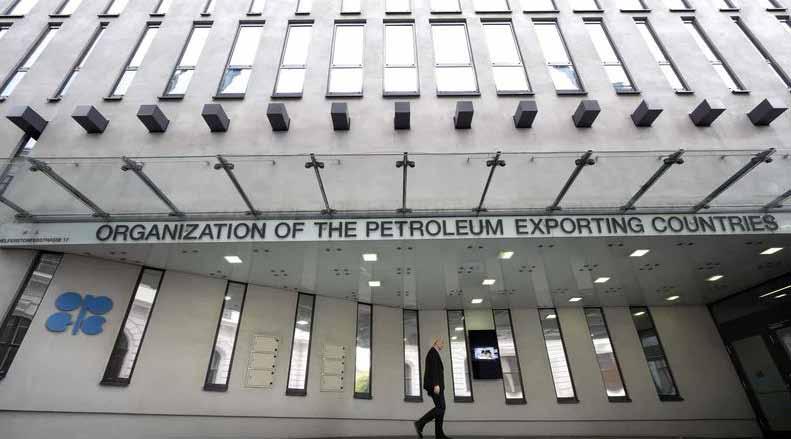
34 14/10/22
A man walks past OPEC headquarters in Vienna on Tuesday on the eve of the 45th meeting of the Joint Ministerial Monitoring Committee and the 33rd OPEC and non-OPEC Ministerial Meeting. Joe Klamar/ AFP via Getty Images
“ American gas prices have come to occupy the lion’s share of the needs of the European market, which means that it was natural for prices to fall due to the large quantities of gas exported.”
Saudi Arabia’s Minister of Energy Abdulaziz bin Salman looks on during a press conference after the 45th Joint Ministe rial Monitoring Com mittee and the 33rd OPEC and non-OPEC Ministerial Meeting in Vienna, Austria, on October 5, 2022. AFP.
supplies are absolutely necessary and it is clear that the OPEC+ group is united with Russia.”
All of this confirms the duplicity of American policy in managing this critical issue at a difficult time when the entire world is fac ing several challenges, most notably the challenge of energy and its distribution. Many indicators point to this duplication, most notably:
• The reaction of many European capitals to the increase in the price of US gas exported to them, which was clearly expressed by French President Emmanuel Macron in his speech before a business conference held in Paris, in which he said: “We say to our American friends, you are wonderful, you provide us with energy and gas, but there is one thing that cannot last for long, and that is that we pay four times the price you sell to your industry. That is not the precise definition of friendship.” The French position was not the only one expressing resentment, but the German position was more explicit, as Berlin raised several questions about friendship with the United States, its nature, outputs, and returns in light of doubling the size of the American gas prices have come to occupy the lion’s share of the needs of the European market, which means that it was nat ural for prices to fall due to the large quantities of gas exported. According to market mechanisms anywhere, the greater the quantity purchased, the lower the price.
• In light of the foregoing, the US administration has asked OPEC+ member countries, led by Saudi Arabia and the UAE, to maintain their production policy regardless of price declines, with the goal of punishing Russia by reducing the oil revenues which it uses to fund its war against Ukraine. In other words, it demands that the oil-producing countries foot the bill to punish the Russian regime, without taking into account their interests and security concerns about the issues with which they are concerned on the
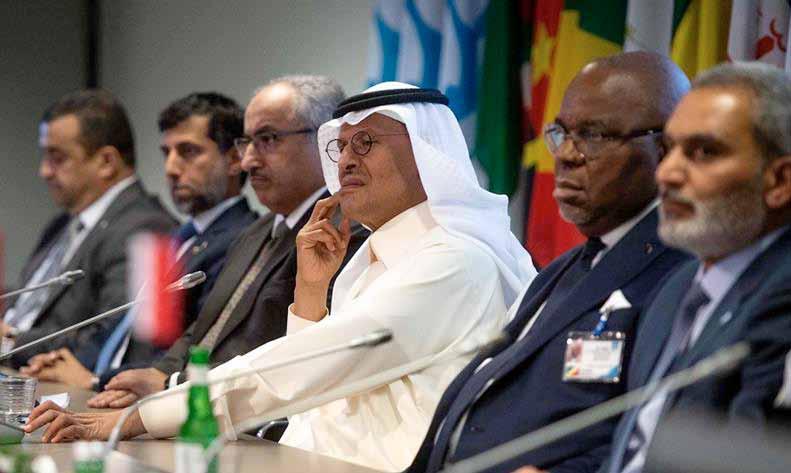
• The reaction of other countries that are more dependent on oil imports, such as India and China, to the decision to cut produc tion in order to stop the downward path of prices in exchange for the rise in gas and coal prices. This was not directed against them, despite the fact that the two countries will suffer far more than the US. The rise in prices will have a significant impact on their country’s economic conditions, which means they understand the economic motivations behind the decision to cut, as opposed to the US position, which tried to employ and manage the situation in a way that ensures the achievement of its interests at the ex pense of everyone else’s.
In summary, the bloc’s decision to cut production gained mo mentum in two dimensions: the first, a positive dimension relat ed to the organization’s essence and objectives, which revolve around being an economic organization that aims to achieve stability in the oil markets while also protecting the interests of oil-producing countries from any conflicts or political am bitions. Saudi Foreign Minister Prince Faisal bin Farhan con firmed this in an interview with Al Arabiya TV, saying: “The OPEC+ decision is purely economic, and it was unanimously adopted by the member countries, and they do not consider any political interpretations related to OPEC+ decisions. These countries acted responsibly and took the appropriate decision, seeking market stability and achieving the interests of producers and consumers.”
The second dimension is about power balances and conflicts, as everyone tried to disengage between their current and future in terests, ignoring reactions that could lead to the sacrifice of old alliances and ongoing friendships for the sake of immediate in terests.
35 14/10/22
one hand, and their economic interests and development needs on the other.
Racism in American TV Advertisements

Opinions on New Trend of Black Representation
By Mohammad Ali Salih – Washington
Starting two years ago, with the killing of Black George Floyd by the knee of a White policeman, through the expansion of Black Lives Movement (BLM), to the progressive racial policies of President Joe Biden, the relations between Whites and Blacks in America, ironically, seems to be more negative than positive. Recently, Newsweek magazine had a cover story about division among White Americans about how to treat Blacks. Moreover, the London-based Economist recently published a cover story critical of Biden’s progressive policies, particularly those about racial relations.
It is not by accident that both Britain and the US have recently been engulfed in a new racial debate: the number of Blacks in TV advertisements.
Opponents said that while Black Americans are 12 percent of the population, they appeared in about 40 percent of TV advertise ments – about the same for Black British although they are only one percent of the population.
Needless to say that most of these opponents are White, but the race problem in America has mostly been about White fear of Blacks, and Black mistrust in Whites.
There seems to be more than one question about this new trend by major American companies and their advertising agencies, which are, ironically, controlled by Whites:
First, do they believe that they can somehow make amends for past slavery and racial discrimination?
Second, are they terrified of being called out as racists?
Third, is this an exaggerated correction for perennial accusa tions by Blacks that they were under-represented in television
36 14/10/22 ocietyS
Opposite
A biracial family fea tured in a commercial for a clothes brand.
and movies?
Fourth, is it their guilty consciences for the still-present racism, direct or indirect?
Following are two opposing opinions that illustrate the root of the problem. On one side, Whites are afraid of Black anger and, therefore, are eager to please them, and on the other side is Black distrust of Whites, even if, as in this case, the Whites are favoring the Blacks – or are they really doing that?
On one side, Rob Rhode, who is the editor-in-chief of the “Cranky Creative” website that specializes in TV advertisements, and on the other side, Christopher Boulton, who is Associate Professor of Communication at the University of Tampa (Florida).
RHODE: “WHITE GUILT”
“Let’s talk about diversity in TV commercials
If you only watched TV, you might think that Whites are a mi nority in the United States; or that the United States population is nearly 70 percent Black and 30 percent ‘Other.’
You’d be wrong, of course. According to the 2020 Census, Whites make up 62 percent of the population, Blacks 12 percent, Hispanics or Latinos 19 percent, and Asians six percent …
Yet, today it’s getting to the point where the average family in a TV commercial will soon consist of a Black man, a White wom an, and their two Chinese kids.
While there’s no doubt that society is becoming more diverse, you have to admit that something feels off here.
It’s a legitimate question to ask why 12 percent of the population is given so much representation and the Whites are a shrinking minority in U.S. television commercials … Where are the Hispanic and Asian people?
Together, these groups now account for 25 percent of the U.S. population, yet they do not appear in anywhere near 25 percent of the advertising.
Going by the commercials, one would think that Hispanic and Asian people make up a far smaller percentage of the population than Blacks, when in fact their number is double.
This is not authentic. This is not realistic or representative. And unfortunately, the frequency of the misrepresentation is only one part of the problem.
Why?
First, advertisement research suggests that minority consumers prefer to see Whites in TV ads when those ads do not include their own ethnic group.
Second, ads show Blacks who do not represent Blacks who are mostly of a lesser socio-economic level.
Third, Black TV stars seem to walk, talk, dress and behave like Whites as they try to be successful in life …
We see it all the time: Blacks in an upper-middle-class family, wearing upper-middle-class clothes, living in an upper-middleclass home and doing upper-middle-class things, like attending piano recitals, or gaming with pals on razor-thin laptops, or hav ing a backyard birthday party complete with pink princess deco rations and a tent and giant bounce-house …
What a sad missed opportunity for companies and their advertise ment agencies, to show the best in all of us. And to celebrate the things that make our cultures interwoven -- instead of this color separation.
For now, the only thing “equitable” about all this is how equally insulting it is to everyone …”
BOULTON: “THANKS BUT NO THANKS”
“Advertising has this unique ability to persuade by creating the appearance of change through rhetoric, symbols and events. When it comes to race, advertising has helped corporations and existing power structures conceal and protect White gains and Black losses ….
So as Black Lives Matter gained mainstream acceptance, compa nies that were eager to stay on trend turned to ad agencies to help them join the movement through woke messaging.
Long-standing public pressure campaigns to end commercial monuments to White supremacy were, in fact, finally successful this time.
While these hard-won victories are worth savoring, they are still largely symbolic because it’s hard to ascribe them to any true change of attitude …
The people spoke, but it was really that money talked. So, when Proctor & Gamble tells its consumers that ‘Now is the time to be Anti-Racist,’ one has to wonder whether the companies and the agencies that produced the ad are serious.
Because, when it comes to feigning change while continuing to marginalize Black lives and maintain White power, advertising has a long record as a repeat offender …
And nothing demonstrates that more clearly than the ongoing, striking lack of diversity in the advertising industry itself.
Heads of major corporations and advertising agencies, according to researches that I have conducted with my students, are less than one percent (0.7) Black — a stark contrast to the 13 percent of the U.S. population that is Black …
Recently, an open letter from a coalition of 600 Black advertising professionals called for urgent action from agency leadership … But, neither major corporations, nor the American Advertising Federation, even bothered to take the letter seriously …”

37 14/10/22
Do major American companies believe that they can make amends for past slavery and racial discrimination? Or are they terrified of being called out as racists?
pinion
Prime Minister Liz Truss and the Mini-Budget
By Saif Al-Abri

Britain has been hit by one turmoil after the other from a sluggish economy, Brexit, resigning prime ministers, to the Queen›s unfortunate passing. For the UK to be withstanding such turmoil and still maintaining order is remarkable (I may be jumping the gun here). Now they are facing a chaotic market and a declining currency caused by Prime Minister (PM) Liz Truss›s announcements. PMs always have to come into office with a splash; for Liz Truss, it is through her ambitious economic policy. Will her approach withstand scrutiny?
Continue the article and find out.
encourage investment. Unfortunately, union rules will be toughened, and the bank bonuses cap restrictions will be removed. In addition, jobseeker claimant commitment rules will be tightened up to reduce unemployment benefit spending. A significant piece is the Energy Price Guarantee which “will cap the unit price that consumers pay for electricity and gas, limiting the average household bill to 2,500£.”
PMs always have to come into office with a splash; for Liz Truss, it is through her ambitious economic policy. Will her approach withstand scrutiny
Prime Minister Liz Truss is often seen as following the lead of Thatcher-Reagan and free market capitalism. This revolves around reducing government spending and deficit whilst encouraging spending and investment by lowering taxes and regulations. However, for Reagan, government spending increased by a third, the deficit increased by %50, and tax decreased only for high-income earners rather than for all. Even the level of regulation remained the same, according to Christopher De Muth, head of the American Enterprise Institute. Under Thatcher›s government, the spending growth rate and budget deficit did decrease. If PM Liz decides to follow the lead of her predecessors and stick with free market principles, it will help reduce the UK›s high budget deficit and government spending. However, it seems the timing of her policies couldn’t be more wrong. But before discussing that, let›s briefly look at the mini-budget›s particulars.
The mini-budget plan will impact several things. It will reduce the basic tax rate from %20 to %19 and will cancel the planned increase in corporation tax. In total, the tax cuts will cost 27£bn next year and 45£bn by 2 2026. They also aim in this budget to remove the «complex patchwork of planning restrictions and EUderived laws that constrain our growth» and to
Apart from where in the world will the budget be funded, one significant criticism is that there seems to be a lack of coordination between the central bank and the government. Before the mini-budget, the main concern for the government and the Bank of England was inflation, not growth. This was followed by hikes in interest and quantitative tightening to slow the overheated economy reduce the money supply, and offset inflation. But the new mini budget emphasises “growth, growth, growth,” as Liz Truss stated. It aims at both reducing taxes and stimulating spending and investment. If successful, will have a devastating impact on inflation. There is an apparent conflict between the central bank›s aims of controlling inflation, allowing a rise in unemployment and a possible recession, and the government’s plan which is the complete opposite. It seems to be a zero-sum game between the BoE and the government. The reveal of this mini-budget has caused havoc in the UK stock market and currency, leading to emergency interventions from the BoE to ensure the nation›s financial stability. The way Liz Truss introduced the bill was not well planned. Furthermore, to counter the BoE efforts seems counter-productive because if, for instance, PM Liz Truss wants to expand the market more, the BoE will respond with higher interest rates, as the chief BoE clearly stated. That is a deplorable move from PM Liz Truss unless there is something we are not seeing.
38 14/10/22
o
?


2 A Weekly Political News Magazine www.majalla.com Issue 1926- October- 14/10/2022 James Cleverly: UK’s New Foreign Secretary

Switzerland: Long Way to Go for Progressive Fathers
The journey was long towards what seems a bit of a progressive, long-awaited step into a more suitable, time-adequate move. A bid to allow fathers to become more involved with their own children and with the aim and hope to reduce the inequalities in child care burden.
Previously, pre-referendum, a man would have only been eligible to one day of pater nity leave. Needless to say, that having to return to work 24 hours after birth is equiv alent to a cynical comic story.
By Luisa Markides

Switzerland, that tends to pride itself for be ing progressive, perhaps due to their strong economic point of view, or being a leader in the world of elites in finance or innovative technology, or perhaps due to their (apart from what concerns Ukraine, but this is a different story) continued neutrality, where Switzerland often acts as a mediator even on a political level.
Despite Switzerland being known for their brilliant self-marketing strategies, is re ally everything that appears perfect really equivalent to the reality? Or is there perhaps something behind the so-called famous quote: “Not everything that shines, is gold”?
Compared to other European countries, Switzerland has been to date still very much behind what concerns family policy. Over years, there were many families struggling with equality, appealing to the govern ment for a simplification of the situation for working parents.
The Swiss population voted on the 27th of September 2020, with a significant majority of 60.3% of votes, that the referendum was accepted.
From the 1st of January 2021, those who have become new fathers are able to claim ten days of paternity leave after their newborn’s birth, with a maximum of 14 days.
The paternity allowance in Switzerland comes to 80% of a monthly employment income, however, not more than CHF196 per day (£178) will be covered by the em ployer.
Another requirement is that paternity leave must be taken within the first 6 months of the baby’s birth. Compared to the maternity leave, fathers are able to redeem single days or with some interruption as the 10-14 days do not need to be taken consecutively. Although this new referendum was accept ed just a shy over two years ago, it shows that there is still very much room for im provement. Switzerland lies at the very end the line of countries when it comes to pa rental leave after a new birth. While many European countries offer at least 40 weeks of parental leave, the Swiss population only has 14 weeks for mothers and two weeks for fathers.
Despite the government’s acknowledging that working women are an important factor and resource for industry, the given condi tion makes it very difficult as 14 weeks are not in favor of a mother. However, flexible working hours as part-time employment are widely spread, but organizing the juggle between childcare and workplace is often too much of a burden for the young fam ily. Sadly, it may be recognized that many women feel their career opportunity termi
42 14/10/22 piniono
nates, even if in some cases temporarily, after welcoming a first child.
Let us have a brief view on how a few neighbor ing countries are handling their parental leave.
Spain appears as one of the most progressive countries when it comes to parental leave. Just recently, in January 2021, the same month as the Swiss included parental leave for the very first time with two weeks, Spain increased the paren tal leave to 16 weeks. This time away from the workplace for men is fully paid. Italian fathers had introduced the same year a ten-day paternity leave on full payment and have made it com pulsory for everyone. It is a similar policy for French fathers, where one week is also compul sory, followed by a total of 28 days of paternity leave if desired. In Germany fathers do not have statutory leave, however, they are allowed to re quest up to 14 months in which they are compen sated between Euro 300 and Euro1,800 a month. In the United Kingdom, fathers are allowed up to two weeks of paid parental leave or are entitled to take advantage of a shared parental leave. In that scheme, parents can share up to 50 weeks of leave in which up to 37 weeks are paid.

Seeing all these data, the question comes as no surprise, what has really changed in Switzerland over the past two years – in short, not much. It was a long struggle that eventually achieved the ten days of parental leave for men in Swit zerland.
However, statistics show sadly that of 89,000
new-born children in 2021, only about 42,000 fathers requested paternity leave during the first year since the referendum. Not even half. Not ex actly what was expected. Difficult to define what leads to such a low percentage of fathers taking their paternity leave. It could be a bureaucratic issue as paternity leave must be taken within six months of a child’s birth. The fear of the un known could also be a problem that leads to fa thers’ not requesting parental leave. It might take some time for the shift in culture. Some might feel a pressure from their employer even though it is every man’s right to be on leave. Some fa thers have therefore renounced on their own ini tiative the right of ten days parental leave. It might be true that perhaps it is just a matter of time for the above-mentioned shift that first needs to take in a society. A vote is just a vote, until it is entirely implemented and lived on a daily basis. Hence, it seems, most young fami lies tend to resolve their new family life as they always did over the past century. Either the man goes straight back to work the following day af ter the baby’s birth, or they try to juggle by tak ing annual leave during those first few days or weeks.
Switzerland- as progressive as it is on many as pects, so far is behind on what concerns a bal anced-equality family life. The journey seems a long one ahead… But at least the groundwork was laid at that end of September two years ago. There’s hope.
43 14/10/22
Compared to other European countries, Switzerland has been to date still very much behind what concerns family policy .
ovies
‘Till’: A Powerful Portrait of a Mother
Who Turned Loss Into Meaningful Action
A Film About Bearing Witness
By Katie Walsh
The tragic story of Emmett Till is one of a face. The face of a 14-year-old boy, beaten and mur dered in Mississippi, a battered and bloated face that his mother insisted be seen by the world. Chi nonye Chukwu’s “Till” is a story of two faces: Emmett’s and that of his mother Mamie Till-Mob
ley, portrayed by Danielle Deadwyler in a pow erfully skilled and undeniably star-making screen performance.
In imagining a way to tell Emmett Till’s story without focusing on the violence and torture the boy suffered, Chukwu, along with co-writers Mi chael Reilly and Till investigator and filmmaker Keith Beauchamp, focus on his mother, Mamie,

44 14/10/22
M
whose decision to share her son’s face with the world had an indelible impact on the civil rights movement.
In “Till,” Chicago city kid Emmett (Jalyn Hall) is a beloved only son and the embodiment of Black boy joy. He has not grown up with the fear of vio lent racism as his Mississippi cousins have, and he moves in the world with the comfort and ease that his mother has imbued in him with her love and protection. She shields him from quotidian microaggressions, and her warnings about how to behave with Southern white folks are unfortu nately too little too late for the ebullient Emmett, called Bo, or BoBo, by his loved ones. Despite his cousin’s warnings, he pays a white woman (Haley Bennett) an innocent compliment, expecting ap preciation for his kindness. What he receives is a brutal death sentence: kidnapped, tortured, shot and dumped.
Chukwu does not visualize this violence for the viewer. We witness Emmett’s kidnapping, and experience his torture briefly, from a distance, muffled noises the only evidence. In “Till,” a film about bearing witness, it is not about conjuring the things that were not seen, but examining the evidence from the witnesses who were there. It’s also not about retraumatizing an audience, but rather, honoring a woman who turned her trauma and loss into meaningful action.
Bearing witness becomes everything for Mamie, who insists her son’s body be delivered to Chi cago, who insists he be dressed in his finest, who insists that his broken body be viewed by her family, her community and the entire nation. “We have to look,” she insists.
Chukwu tells “Till” through Mamie’s face, fram ing Deadwyler’s visage and large, expressive eyes in the tradition of Carl Theodor Dreyer’s 1928 silent film “The Passion of Joan of Arc.” In the same way that Dreyer captured actress Ma ria Falconetti’s face while Joan of Arc withstands her trial, so too does Chukwu capture Mamie’s experience choosing to testify at the trial of her son’s murderers. In a long take, the camera slowly moves around Deadwyler from her profile framed against the white male jury to a close-up as she as she delivers a breathtaking performance of Mamie’s testimony.
Chukwu and cinematographer Bobby Bukowski utilize a variety of camera movements to cap
ture Deadwyler’s performance throughout “Till,” from dolly zooms, to handheld cameras, to long tracking shots. The complex cinematography is coupled with sumptuous visual style, the produc tion design by Curt Beech and costume design by Marci Rodgers nodding to Douglas Sirk’s 1950s melodramas.
In adopting a rich, Sirkian look, Chukwu affords a visual luxury that is often denied to this kind of story, giving it a beauty and significance that it deserves, as Deadwyler glows glamorously in every moment. It also offers the opportunity to the audience to truly take in the images and critically assess their meaning, as Sirk’s films were rife with social critique, his aesthetics extrapolated by filmmakers such as Todd Haynes and Rainer Werner Fassbinder to their own storytelling ends. Using a variety of filmmaking techniques, Chukwu asks us to look at Deadwyler’s perfor mance as Mamie in many different ways — to study her grief, her herculean poise, the polarity between her power and vulnerability — and to truly understand and feel the enormity of what she accomplished. The result is a true achievement of filmmaking to create an emotional, affecting por trait of a mother and an unlikely civil rights pio neer, and to pay loving tribute to the life and death of Emmett Till.
This article was originally published by TNS.
‘TILL’
4 stars (out of 4)
MPAA rating: PG-13 (for thematic content in volving racism, strong disturbing images and racial slurs)

Running time: 2:10
How to watch: In theaters Friday
45 14/10/22
“Till” is a story of two faces: Emmett’s and that of his mother Mamie Till-Mobley, portrayed by Danielle Deadwyler in a powerfully skilled and undeniably star-making screen performance.
Danielle Deadwyler, left, and Whoopi Goldberg in “Till.” (MGM/ Entertainment Pictures/ Zuma Press/TNS)
Culture
Going Once, Going Twice, Sold!
Catsaros: Egypt’s Oldest Auction Hall
By Menna A. Farouk
In a narrow corridor branching from a street in downtown Cairo, Egypt’s oldest auction house stands out.
Catsaros Auction Hall is the first proper auc tion hall in Egypt and the Middle East, hosting antiques that have passed through several ages and are characterized by their precision and craftsmanship.
In this Hall, the history of antiques from royal times is displayed.
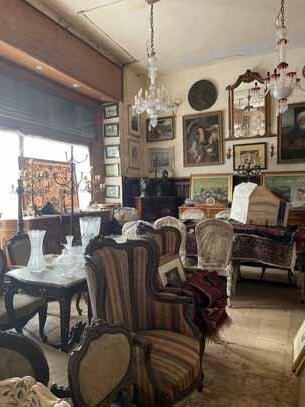
The Auction Hall started as a cinematic studio in 1918 by a Greek man called Catsaros and his friend Michael Mikhailidis before being turned into an antiques auction hall.
Movie lovers in Egypt are well aware of the old Egyptian movie posters, with the phrase “the
interior views were taken at Catsaros Studio.”
Since the beginning of the twentieth century, the Greeks have been abundant in Egypt and among them were Catsaros and Mikhailidis. “My grandfather (Mikhailidis) was specifically
46 14/10/22
Photo shows the antiques inside the Catsaros Auction Hall in downtown Cairo.
Credit: Menna A. Farouk
Three years ago, Catsaros completed its first centenary, a hundred years of tales that have turned into “antiques.”
responsible for supplying furniture and other movie props. Aside from being a lover of antiques, he also used to write some movie stories, and there are films that were shot here,” said Magdy Mahmoud, the grandson of Mikhailidis.
The studio continued to operate until the early 1940s. With the establishment of Stu dio Misr in 1935 by Egyptian economist Ta laat Harb, Catsaros exited the market and his place turned into an auction hall, supervised by Mikhailidis.
The Hall continued its work until the death of Mikhailidis in 1971, when the manage ment of Catsaros was passed to his daughter Helena, and her name became famous as the first auctioneer in Egypt, especially after she obtained Egyptian citizenship.
The management of the place continued un
changed until the death of Helena when her son Magdy Mahmoud became the supervisor and manager of the place.
The son, an expert in evaluating art and an tiques, said: “Trust in the place, good repu tation, integrity and transparency in deal ing with customers are things we inherited from my grandfather and then my mother, and they are the most prominent factors that made the place live for 100 years.”
“Customers come and tell me that their fa thers bought antiques from my mother, or their grandfathers bought antiques from my grandfather, and they even keep the old pur chase invoices bearing the name of Catsaros, which, of course, is a source of pride for me.
“I am so happy when I hear that from them. Therefore, I am trying hard to preserve this reputation which in the past reached the pal aces of kings, noble families and aristocra cy.”
Three years ago, Catsaros completed its first centenary, a hundred years of tales that have turned into “antiques.”

“The Hall used to include dozens of old col lectibles that were kept by presidents and kings, but with recent changes, the sale of collectibles is done through direct sales and this system is still in use until the present time,” Mahmoud said.
Mahmoud opens the Hall’s doors to every one, from antiques enthusiasts to lovers of arts and culture. He shares with them their passion for the Hall’s holdings and recounts his experiences in the Hall.
The owner of the Hall added that he obtains
47 14/10/22
Photo shows the façade of the Catsaros Auction Hall in downtown Cairo. Credit: Menna A. Farouk
Catsaros Auction Hall is the first proper auction hall in Egypt and the Middle East, hosting antiques that have passed through several ages and are characterized by their precision and craftsmanship.
old pieces and antiques from houses whose owners resort to liquidating their holdings.



The Hall also connects people who want to sell their antiques and buyers while taking a commission.
The Hall also gets customers who love to restore their home’s possessions or want to change some of their antiques, and in both cases they contact the Hall.
French, English and Italian pieces of furni ture at the Hall are made of copper, bronze and gold. Here, there are also signed draw ings, the oldest telephones known to man kind and other antiques that are more than 100 years old.
Following Catsaros’ celebration of its first centenary, it turned to another activity, which
is organizing cultural activities and seminars and attracting clients who became friends of the place over time and all of whom are intel lectuals.
“We want this place to always remain a place for Egyptian intellectuals and be a hub for cultural and heritage events,” he added.
48 14/10/22
The Hall also connects people who want to sell their antiques and buyers while taking a commission.
Photo shows the antiques inside the Catsaros Auction Hall in downtown Cairo.
Credit: Menna A. Farouk
Photo shows the antiques inside the Catsaros Auction Hall in downtown Cairo. Credit: Menna A. Farouk
Photo shows the antiques inside the Catsaros Auction Hall in downtown Cairo. Credit: Menna A. Farouk

ports
Maha Al-Barghouthi: Jordan’s First Gold Medalist in an Olympic Event
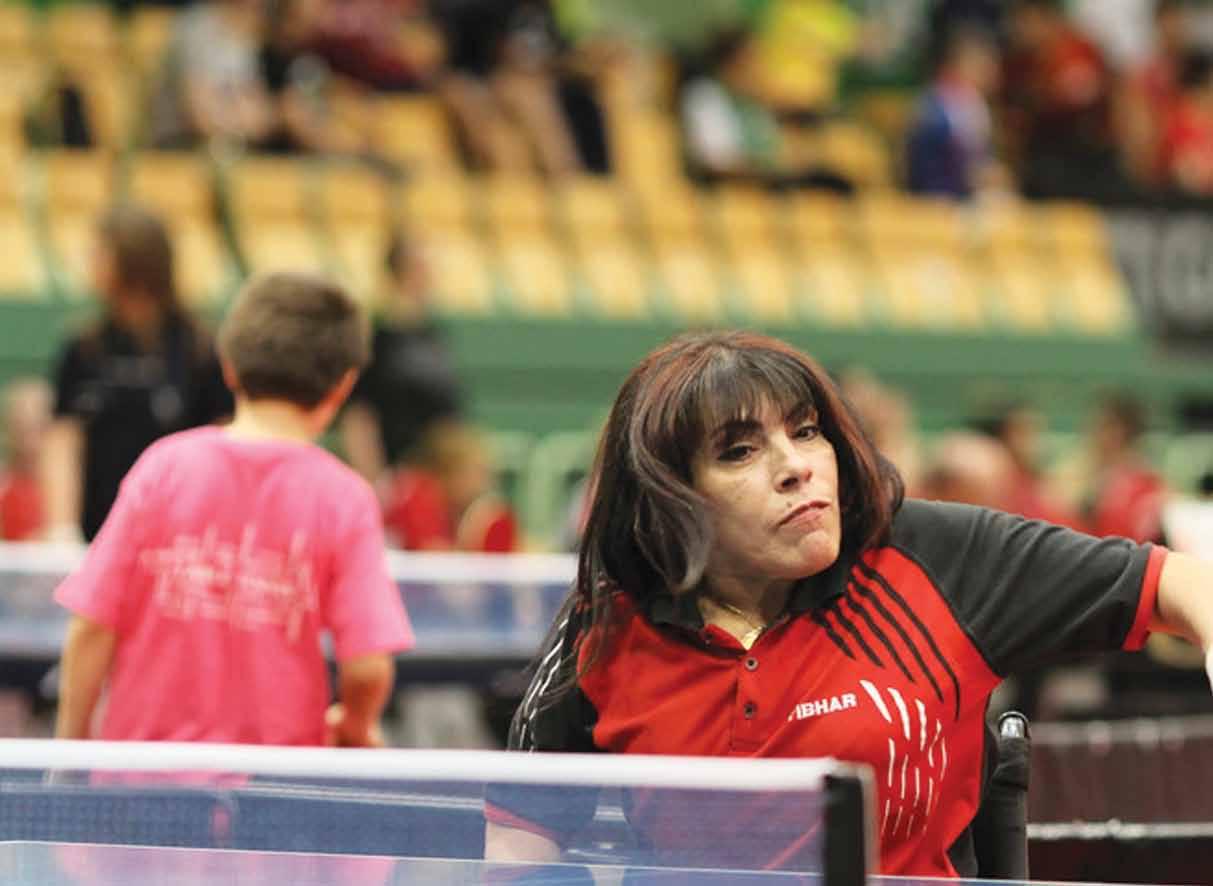
Secretary-General of Jordan’s Paralympic Committee speaks to Majalla about her journey to medals and accolades
By Sarah Gamal
Since the establishment of the Jordanian state in the twenties of the last century, the national sports move ment has been active, progressed, and accomplished. This occurred despite various challenges and limited capabilities which did not prevent Jordanian sports from competing and opening doors to the rest of the
world with royal support and youthful ambition. Jordanian athletes have risen to the top of internation al podiums, most notably Ahmad Abughaush, who won the gold medal in taekwondo competitions at the 2016 Olympic Games in Rio de Janeiro. This triumph was preceded by the success of athletes with disabilities in raising the Jordanian flag at the Paralympic Games, including Maha Al-Barghouthi,
50 14/10/22
Maha Al-Barghouthi (Credit: Gaël Marziou (Lasko, 2015)
who brought home three medals, one of which was gold.
Maha Al-Barghouthi is the Secretary-General of the Jordan Paralympic Committee and a former Paralym pic champion in para table tennis. A champion who refuses to acknowledge disability has made challenges the hallmark of a diverse and successful sporting ca reer.
Al-Barghouthi is a legend in Jordan and the sporting world. She qualified for and competed in five Paralym pic Games (Sydney 2000, Athens 2004, Beijing 2008, London 2012 and Rio 2016). The disabled athlete was the first to win a gold medal and hoist Jordan’s flag at the highest sporting gathering — the Paralympics — held concurrently with the Olympic Games. In 1995, she won the 200m wheelchair run in Berlin, setting a world record for Jordan. Al-Barghouthi also won Jordan’s first gold medal in table tennis singles at the 2000 Paralympic Games in Sydney, Australia: “I’ve always wanted to be the one to carry Jordan’s name high in an Olympic event, and thank God, my dream has come true,” Al-Barghouthi said at the time of her victory in the wheelchair table tennis competi tion at the Sydney Paralympics.
To emphasize the significance of her accomplish ments, it is worth noting that since 1980, when Jordan first competed in the Olympic Games, the Kingdom’s national anthem was first played in Sydney 2000 when Barghouthi won a gold medal in wheelchair ta ble tennis. That honor was only repeated at the 2016 Olympics by Jordanian taekwondo athlete Ahmad Abughaush, who won gold medal in the 68-kilogram category.
Al-Barghouthi was born with polio, but this did not stop her from excelling in sports. At the age of 17, she went to the Jordan Table Tennis Federation, where she was classified as a wheelchair-runner, but she also played table tennis, which she began as a hobby by participating in tournaments but finished as a profes sional. Al-Barghouthi had won 105 different medals in various international, local, and Arab competitions. She ended her sports career, which began in 1984, af ter 30 years, with many sporting accomplishments at the international and local levels.
In recalling her own athletic experience with Majalla, Al-Barghouthi stated that sports for those with spe cial needs are not as simple as many believe. “There are special equipment and set-ups that we must fol low when practicing and competing, in addition to the need for proper transportation to and from practice,” she explained.
Jordan’s most decorated sportswoman told Majalla that her father and mother are her first and last fans, as well as role models, because they have dealt with her in a civilized, conscious, and scientific manner
since the beginning of her polio, so that their daughter would not feel any different from her peers.
“When I was born, my parents realized that the sports infrastructure and places in general were not helping or in line with the needs of individuals with disabili ties, and there were many deficiencies that hindered my progress,” the Jordanian champion explained. “However, they taught me that I must keep pace with those deficiencies with determination, will, science, and sports.”
Al-Barghouthi has competed in a number of interna tional competitions and has consistently performed admirably. This aided her qualification for the 2000 Paralympic Games in Sydney. During competitions, she tied the racket to her hand to keep it from fall ing and insisted on playing with stronger players than herself.
Al-Barghouthi said of winning Jordan’s first gold medal in para table tennis singles at the 2000 Para lympic Games in Sydney: “It was an indescribable feeling of pride that I raised the name of my beloved country Jordan with the raising of the Jordanian flag at Paralympic Sydney 2000, and my personal joy in accomplishing something that no one has ever done before. At that moment, I realized I had etched my name among the cavalcade of distinguished people as a human being and as a disabled athlete,” she said. “My victory was a message to people to learn about handicapped sports and to encourage other families not to discriminate against their handicapped children and instead to encourage their children to participate in sports,” Al-Barghouthi added.
Her greatest achievement, however, came during the 1995 Berlin Special Olympics, when she broke the world record in the 200 meter run with a time of 32.26 seconds, which was .08 seconds faster than the previ ous record: “I worked very hard for the Olympics in 2000 and was determined to win a gold medal, which I did. This demonstrated that people who believe in themselves and their work will achieve good results,” Al-Barghouthi said.
Concerning the challenges she faced during her ath letic career, Al-Barghouthi stated that she was work

51 14/10/22
In recalling her own athletic experience with Majalla, AlBarghouthi stated that sports for those with special needs are not as simple as many believe.
s
ing to overcome all of them. At both the local and international levels, while travelling for matches and tournaments, she was self-sufficient, as her family had taught her. She travelled alone to America and Canada, which did not pose any problems for her.
disability should not rely on others or be a dependent person, but rather should learn to rely on themselves as much as possible.
“
I faced many obstacles at all levels, including dis crimination between disabled and non-disabled chil dren when I was a child, and the environment was one of the obstacles due to a lack of facilities for peo ple with disabilities, in addition to the education dif ficulties and society’s view of this group, particularly if it was a girl,” Al-Barghouthi said to Majalla.
“Despite this, I did not experience any frustration or hindrance as a result of these obstacles, whether psy chological or social. Rather, I became more insistent and challenged everything that stood in my way of climbing the ladder of success,” she continued. Al-Barghouthi emphasized that an individual with a
Al-Barghouthi has competed in a number of international competitions and has consistently performed admirably. This aided her qualification for the 2000 Paralympic Games in Sydney.

Her outstanding career and gold medal achievements were recognized when she won a gold medal at the 1999 Pan-Arab Games and several world champion ships. In January 2001, His Majesty King Abdullah bestowed the Al Hussein Medal of the First Order on Al-Barghouthi shortly after she returned to Jordan with the gold medal. Jordan’s champion also received similar royal recognition from HRH Prince Ra’ed

52 14/10/22
Maha Al-Barghouthi (Credit: Gaël Marziou (Lasko, 2013)
port
Jordan’s most decorated sportswoman, Maha AlBarghouthi (Courtesy: Maha Al-Barghouthi)
Bin Zeid, who heads the Jordan Sports Federation for the Handicapped (JSFH).
In speaking of the most significant accomplishments of which Al-Barghouthi is proud: “My receiving many colored medals, the most important of which is the Sydney 2000 gold, and my receiving honorary titles, including actual titles at the sporting and practical level, but the most important title I received was the ‘Secretary-General of the Jordanian Paralympic Com mittee,’ which is my first home. They supported me and I am proud to return the favor by accepting this position and completing the journey with an honorable path to this great edifice.”
“I was also very gratified to receive the Hashemite Kingdom of Jordan’s Centennial Medal of Inde pendence for being the first female Secretary-Gener al. In addition, winning the International Paralympic Federation’s Inspirational Women Leaders Award in 2020, not at the Arab level, but at the interna tional level, demonstrates that our voice as people with disabilities is heard loudly,” Al-Barghouthi said proudly.

Speaking about the Jordanian Paralympic sport, Al-Barghouthi stated that it has recently and gradu ally developed, gaining interest and understanding across the spectrum of society as well as good me dia coverage. By contrast, in its early days nearly 20 years ago, the Jordanian Paralympic sport was unknown, and astonishment filled the faces of the audience. Proponents of the sport were suffering from society’s perception of them, as they were at tempting to persuade society that such sports can be practiced and played by people with special needs
just like any other player.
“Jordanian Paralympic sports, in particular, are con stantly evolving and achieving unprecedented feats, the most recent of which was our heroes’ winning of four gold and one bronze medals at Paralympic Tokyo 2020,” Al-Barghouthi said
“As for the Arab world, it is also in continuous de velopment and prosperity, and proves that Paralympic players are always distinguished in all sporting arenas if they have the opportunity to prove their worth,” AlBarghouthi added.
Jordan’s most decorated sportswoman wanted to send a message to young people, particularly young people with disabilities, at the end of our pleasant meeting saying: “Seek out and try to achieve your dream, no matter how difficult it may be. True dis ability is the neutralization and frustration of your desire to achieve your goals. The keys to success are perseverance, determination, and faith in one’s own abilities.”
53 14/10/22
Jordan Paralympics Legend Maha Al-Barghouthi (Courtesy: Maha AlBarghouthi)
Al-Barghouthi emphasized that an individual with a disability should not rely on others or be a dependent person, but rather should learn to rely on themselves as much as possible.
Po rt ra it
James Cleverly: UK’s New Foreign Secretary
By Luisa Markides
Illustrated by Jeannette Khouri

The UK government announced last month the appointment of former Edu cation Minister, James Cleverly, as Foreign Minister, to replace Liz Truss, who officially assumed the premier ship after being elected leader of the Conservative Party.
Cleverly, a longtime ally of Boris Johnson and a strong supporter of Truss, is considered a suitable choice for a prominent position in the for eign policy, according to observers, as he previously held positions related to international relations and foreign policy.
Who is the new British Foreign Sec retary?
Cleverly was born on September 4, 1969, and hails from southeast Lon don. He served as co-chair of the Con servative Party alongside Ben Elliott from 2019 to 2020. His father is a businessman and his mother is of Af rican descent from Sierra Leone and worked as a midwife in a hospital.
He spent much of his childhood with his family in Chelmsford, Essex, and joined the army after completing high school, but his ambition was greater and he went back to education for a degree in business administration. He was initially educated at Riverstone and Colfe’s School, both in London. Cleverly was trained in the army but had his training cut short due to a leg injury in 1989. He pursued and earned a Bachelor’s degree in Hospitality Man agement from Thames Valley Univer sity (now University of West London).
After graduating, he worked for Dutch Publishers United (VNU) and was pro moted to International Sales Manager in 2002.
Previously a member of the London Legislature for Bexley and Bromley from 2008 to 2016, Cleverly served in 2012 as head of the London Fire Ser vice. He was appointed by former UK Prime Minister Johnson, then Mayor of London.
In 2015, he became a member of the British Parliament for the Braintree constituency, and in 2018 he assumed
the position of Deputy Chairman of the Conservative Party. He took over the Assistant Chair of the Conservative Party in 2019 and afterwards served as Minister of State for International Development in 2020, and Minister of Education for Britain in 2022. He was lately appointed as Minister of Foreign Affairs in the Truss government. This is not Cleverly’s first job at the Foreign Office, as he served in the De partment under Truss, and Dominic Raab before that.
Cleverly joined the Conservative lead ership race to replace Theresa May in 2019, but later withdrew, saying fel low MPs were not comfortable with the idea of choosing a “relatively new” politician.
Cleverley supported the 2016 Brexit vote, and in May’s second cabinet, he served as Conservative Party Deputy Chair from 2018 to 2019.
Cleverly also served as Parliamentary Under-Secretary of State for Exiting the European Union from 4 April 2019 to 24 July 2019 in the administration of former Prime Minister May.
54 14/10/22

Technology
The Future of the Metaverse Hinges on Interoperability
The Approach Enables all Related Efforts and Companies to Work Together
By Ash Koosha
The term “metaverse” is overused, and we all feel it. It’s buzzy, pigeonholing, and doesn’t encompass how the underlying technologies could change everything, from meeting to playing, working to shopping, and the overall ways we experience life. It is therefore im perative that we are careful about how we even refer to the metaverse. Its potential offerings have yet to emerge in the market, and companies are fearful of overpromising and hype that could contribute to dis appointment from mass consumers, as we witnessed during the earlier VR craze.
While arguments about what the metaverse even is are common, it is generally agreed that to be of highest use for the most people, it must provide a persistent, fluid connection between experiences—something that has never been done before. To reach that goal, instead of companies creating more walled-off technologies and worlds, the more desirable route will be to deliver an interoperable metaverse that is open to create for as well as experience.
No single company should own the metaverse. We have the opportunity to establish agnostic backbones, platforms, and features that everyone can use right from the beginning of this next tech revolution. The approach enables all related efforts and companies to

56 14/10/22
work together, guaranteeing the freedom of movement across a diverse variety of worlds with a persistent dig ital identity. In this way, the true metaverse will have the opportunity to deliver gaming, music, and all the forms of entertainment, communication, and collabo ration that people and businesses will embrace and use.
WHY INTEROPERABILITY IS ESSENTIAL IN THE METAVERSE

As a technical definition, interoperability is the layer that a network of virtual worlds relies on to transfer the state of something or someone to its new state without the loss of time. It’s a lot like teleporting. Imagine in one world you’re diving deep in a dark green ocean, complete with an oxygen tank, and in a click, you move instantly to another where you’re traipsing across the desert of a far off planet with a full canteen of water.
For you and I, interoperability can be experienced as digital objects and/or states that exist seamlessly be tween different virtual worlds, no matter how experi entially disparate.
To facilitate a simulated experience that is both play able and immersive, an optimal metaverse experience requires one thing in particular: continuity. Continuity in this case refers to the perpetual living “state” of a player or avatar (your digital identity), the surrounding world, and everything within it. Imagine this scenario: I go to my favorite shoe store in the metaverse and the Non-Player Character (NPC) shopkeeper helps me around. Then all of a sudden, I get notified to join my friend’s battle session. Not wanting to miss out, I jump straight into a totally different world. When I return to the digital store the next day, the shopkeeper remem bers me and directs me to a pair of sneakers, which I then purchase (with currency I earned from yesterday’s battle). Afterward, I decide to travel to another world where my new shoes aren’t a wearable item but instead they get me better seats at a concert, or perhaps a shield to defend myself from a dragon. Time is arguably our most important possession, and for a player, if the pro gress in a game is lost, it means valuable time spent in the game is lost. In addition, we keep what we buy in the real world, and we want experiences that mirror that in digital worlds, so…
WHY HAS NO ONE ACHIEVED INTEROP ERABILITY YET?
Interoperability seems a simple, or at least a straightfor ward need. When a single group or company makes a series of completely disparate worlds, they also provide connective tissue to seamlessly link objects, activities, motion, and more without great difficulty. However,
when trying to enable interoperability between various companies and developers, each with their own sepa rate worlds and systems, problems arise. This is be cause each company may use different, proprietary, and closed sets of standards and methods to develop unique experiences for their users. Think Apple v. Microsoft v. Google and the mess that has at times been for the average person trying to gain fluidity between systems or browsers. It is infinitely frustrating. A metaverse that is completely interoperable avoids this from the begin ning.
By establishing a commonly accepted infrastructure layer for companies and other developers, and an in terface for consumers that allows all of the various standards to work together as a compatible stream of information, we can then facilitate interoperability, cre ating bridges that serve any and all systems, creators, and users.
Today, interoperability between creative forces is only achievable through a consensus—it exists in file formats and standards, like those familiar acronyms HTML or SSL. In the near future, everything will be translated and converted in real time, so the consumer experience of moving between worlds will be as seamless as mov ing from website to website has become. It’s an exciting time for the computing industry. The metaverse as it exists today is as much a collective mindset as any number of technologies. For now, it is a driver of innovation for the new generation of founders to transform software for the better. In the next three to five years, we are going to see creative people and com panies demonstrate the human drive toward innovation and an insatiable appetite to solve the big problems. The metaverse will be truly achieved when people stop using the word metaverse and instead use the name of the 10 groundbreaking products that they can’t stop us ing everyday. Interoperability is one of the many traits of these new products, and the future of the metaverse depends on it.
This article was originally published by Fast Company.
57 14/10/22
Interoperability can be experienced as digital objects and/or states that exist seamlessly between different virtual worlds, no matter how experientially disparate.
Credit: (Getty Images)
Natural Ways to Boost Energy
Low Energy Got You Down? These Strategies Can Recharge You
By Matthew Solan
As men age, many factors affect their energy lev els. Muscle mass naturally declines, which makes it harder to stay active. Diet may become less healthy,
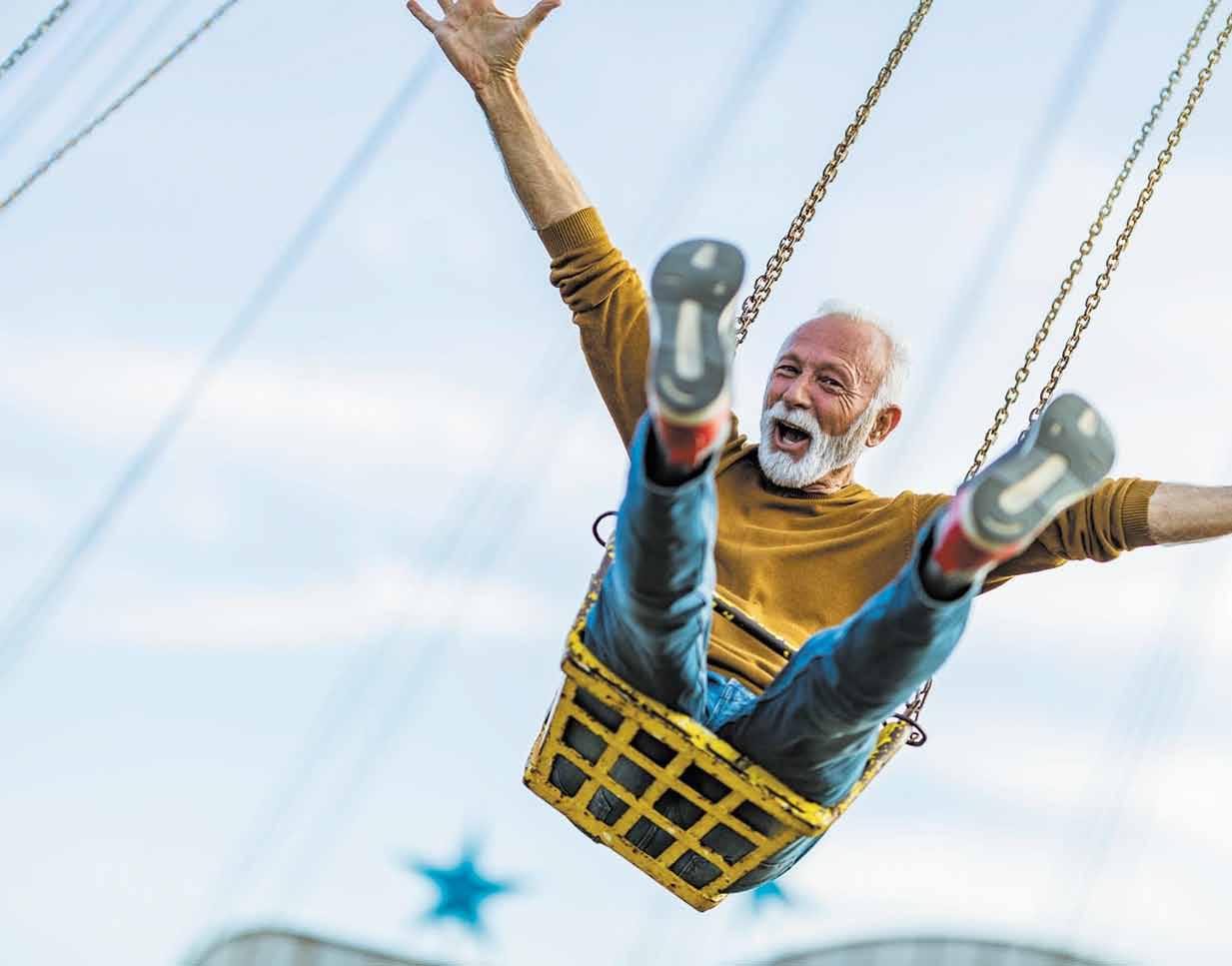
and sleep more erratic.
The body also becomes less efficient at producing adenosine triphosphate (ATP), the energy-carrying molecules found in all living cells. And don’t forget
58 14/10/22
Health
the stress of enduring a two-plus-year pandemic.
“Add it all up, and it’s no surprise that you may feel less energetic at times,” says Dr. Anthony Komaroff, professor of medicine at Harvard Med ical School.
The good news is that the causes of your energy debts are also the solutions for refueling. Here’s a look at how better managing diet, exercise, sleep, and stress can help refuel your depleted energy tank.

DIET
Increasing your intake of polyunsaturated and monounsaturated fatty acids and protein can help boost ATP and muscle mass, according to Dr. Komaroff.
Choose lean meats like chicken and turkey, fatty fish like salmon and tuna, and nuts. Also, eating a small meal or snack every few hours is better than having three large meals a day. “Your brain has very few energy reserves of its own and needs a steady supply of nutrients,” says Dr. Komaroff.
Fatigue also is a sign of dehydration. Although individual needs vary, men should aim for ap proximately 15 cups (about 3.7 liters) of fluids per day from drinks and foods. Water and bever ages like coffee and tea are ideal. Some fruits and vegetables are almost 90% water or higher and
provide a good source of fluids. Examples include cucumbers, zucchini, bell peppers, tomatoes, cel ery, strawberries, peaches, oranges, and melons like watermelon and cantaloupe.
What you don’t eat is equally important. For in stance, cut back on foods with a high glycemic index. These foods, most of which are high in simple carbohydrates, quickly raise blood sugar levels and provide a jolt of energy. But this sud den spike often leads to a sharp drop in blood sugar levels, the so-called sugar crash, which can trigger fatigue.
WHEN DOES LOW ENERGY BECOME A PROBLEM?
See your doctor if you experience prolonged bouts of low energy or if lack of energy begins to affect your daily life. This could be a red flag for a seri ous medical condition, such as heart disease, can cer, anemia (a deficiency of red blood cells), or an autoimmune disease like rheumatoid arthritis.
EXERCISE
Exercise increases energy levels in several ways. “It not only helps add muscle mass but also spurs your body to produce more ATP in your cells,” says Dr. Komaroff. Exercise also boosts energypromoting neurotransmitters in the brain, such as dopamine, norepinephrine, and serotonin, which provide that mental lift you feel after a workout.
Aim for at least 150 minutes of moderate-inten sity aerobic exercise per week. Of course, it can be a challenge to exercise when energy levels are already low, so start small. Some research suggests that just 20 minutes of low-to-moderate aerobic activity, three days a week, can help en ergize you. It doesn’t really matter what kind of exercise you

59 14/10/22
“Your brain has very few energy reserves of its own and needs a steady supply of nutrients.”
Credit: (TNS) Credit: (TNS)
Health
do. Studies have found that non-aerobic exercises like strength training can have the same energyboosting effect as aerobic activities.
SLEEP
Nothing rejuvenates the body and mind more than a good night’s rest. However, this is often difficult for older adults, who may have trouble falling or staying asleep.
It can help to practice good sleep hygiene. For ex ample, go to bed and get up at the same time every day, including weekends, to keep your sleep/wake cycle synchronized with your circadian rhythms. Establish a bedtime ritual in which you give your
Studies have found that nonaerobic exercises like strength training can have the same energyboosting effect as aerobic activities.
self an hour before sleep to bathe, brush your teeth, and relax. Use the bed only for sleeping or sex (no TV or electronic devices). Keep your bed room dark and cool.
Afternoon naps can help with sleep quality, but keep them to 20 to 30 minutes, and don’t nap within several hours of your normal bedtime, as this can disrupt your sleep cycle. “If you still have problems sleeping through the night, see your doctor,” says Dr. Komaroff.
STRESS RELIEF
Regular exercise can help manage stress, but you can also explore mind-body practices that emphasize calming breath control and mind fulness, such as yoga, tai chi, and qi gong. Also, alleviate stress with diversions, like tak ing up a new hobby. Stress that affects your sleep or appetite could be related to anxiety or depression and may require professional therapy.
This article was originally published by Harvard Men’s Health Watch.

60 14/10/22
Credit: (Pexels)
























































































































































